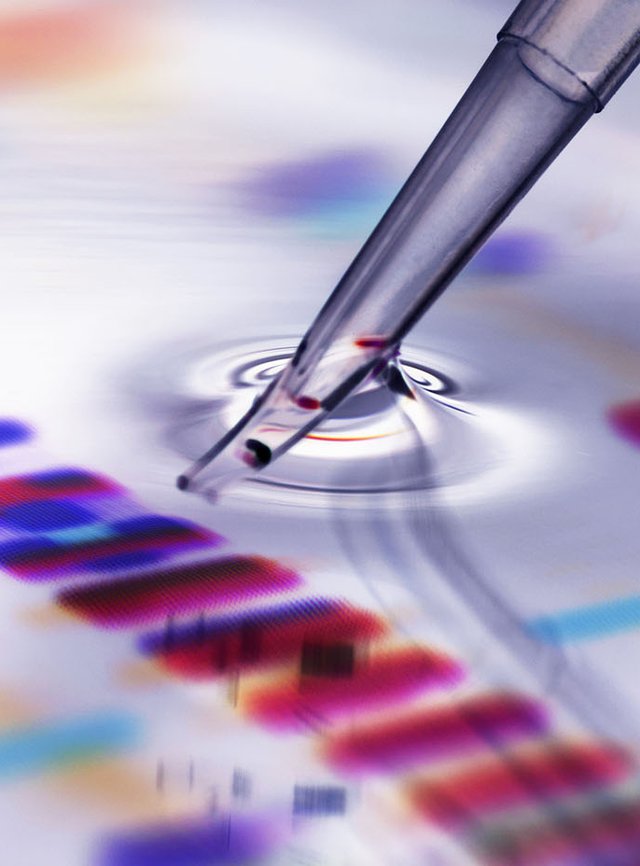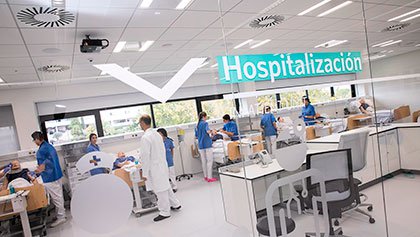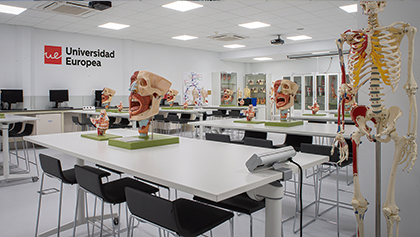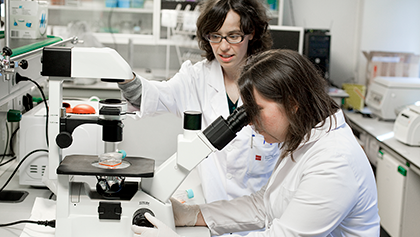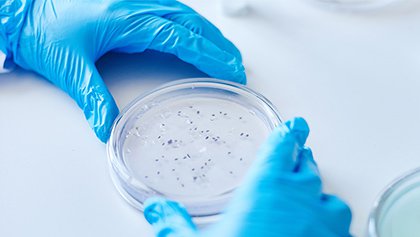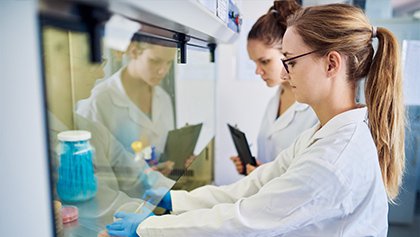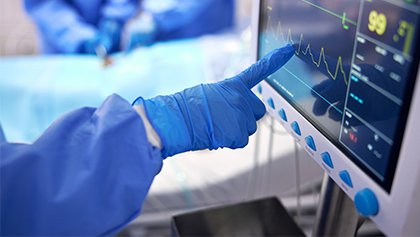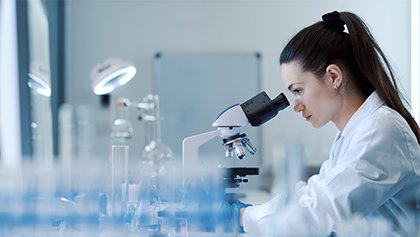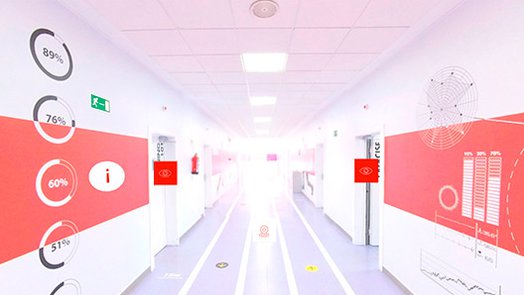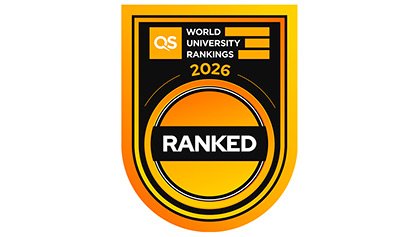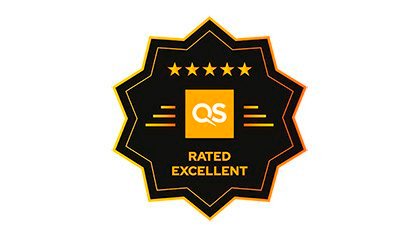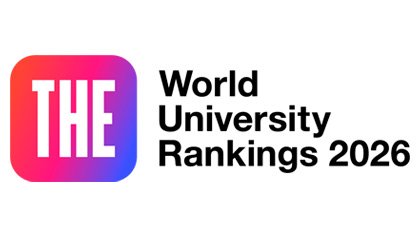-50% Descuento en reserva de plaza para curso 26/27 ¡Solo hasta el 28 de febrero!
Estudia la carrera de Biomedicina, con más de 800 horas prácticas
La biomedicina es una disciplina que integra biología, medicina e ingeniería para estudiar la salud humana. Su aplicación impulsa avances en diagnóstico, tratamiento y prevención de enfermedades mediante herramientas científicas y tecnológicas. Estudia el Grado en Biomedicina y consigue que tu pasión por la ciencia salve vidas, formándote a través de un modelo de aprendizaje que combina teoría y más de 800 horas prácticas en un entorno innovador.
- Desarrolla habilidades en investigación y laboratorio. Aprenderás técnicas avanzadas para impulsar el progreso médico y mejorar la calidad de vida de las personas.
- Conviértete en un profesional con un perfil sanitario integral. Combinarás aspectos clínicos y científicos para responder a las necesidades del sector salud.
- Lleva la investigación a la práctica. Facilitarás la aplicación de los avances científicos al ámbito clínico, contribuyendo al desarrollo de nuevas terapias y diagnósticos.
- Domina el análisis e interpretación de datos biomédicos. Desarrollarás competencias clave para comprender y aplicar la información generada en la investigación en salud.
Título oficial emitido por Universidad Europea de Madrid
| Presencial | Villaviciosa de Odón | 4 Años, 240 ECTS | Inicio: septiembre 2026 | Facultad de Ciencias Biomédicas y de la Salud |
La práctica, eje fundamental
Contarás con más de 800 horas prácticas a lo largo del plan de estudios en grupos reducidos desde 1er curso, garantizando que tu experiencia de aprendizaje sea intensiva y personalizada.
Realizarás prácticas internas en instalaciones de la Universidad, pero también tendrás la oportunidad de impulsar tu carrera en centros de referencia en el sector como el CSIC, el Hospital Nacional de Parapléjicos (HNP) o el Md Anderson Cancer Center International, dándote acceso a participar en investigaciones punteras, trabajar con tecnologías avanzadas en genética, biología molecular, terapias innovadoras, y colaborar directamente en proyectos de vanguardia en el ámbito de la medicina regenerativa, el cáncer y las enfermedades neurodegenerativas.
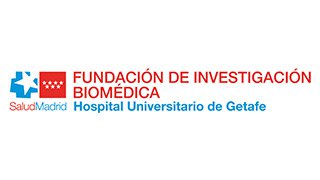
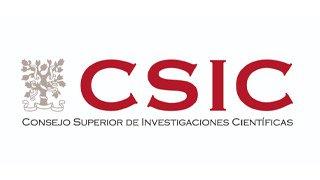
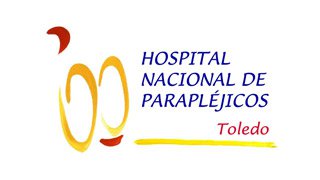
Conoce el Grado en Biomedicina en la Universidad Europea:
Instalaciones
Plan de estudios innovador
El plan de estudios ha sido diseñado para que los estudiantes desarrollen un perfil multidisciplinar y muy práctico, con más de 800 horas de prácticas, adquiriendo conocimientos de los diferentes campos implicados en su profesión, desde la medicina y la investigación clínica y traslacional, hasta el campo de la biología molecular y de la investigación básica, así como de las nuevas ciencias ómicas y el manejo de datos masivos.
Un plan de estudios diseñado desde las necesidades del sector profesional. Adicionalmente, podrás matricularte y compaginar tus estudios de grado, sin coste adicional y sin necesidad de desplazarte, en el Curso de Experto de Arquitectura Molecular*, impartido por profesores con gran experiencia profesional de la propia Universidad Europea.
Durante los primeros años del grado, adquirirás conocimientos más generales para, sucesivamente, y guiado/a por tus profesores, ir descubriendo en qué área de la biomedicina te gustaría especializarte, con gran importancia en la formación práctica, tanto en los laboratorios de la propia universidad, como las prácticas externas en centros de investigación o empresas del sector. Nuestro modelo académico, basado en la metodología de aprendizaje experiencial, persigue la adquisición de un conocimiento integrado desde el primer curso, potenciando la inquietud investigadora y el desarrollo del pensamiento crítico en nuestros estudiantes.
*Sujeto a disponibilidad de plazas.
Estructura del plan de estudios
Programa de estudios
PRIMER CURSO
| Materia | ECTS | Tipo | Idioma de impartición |
|---|---|---|---|
| Biología Celular | 6 | BASICA | Español (es) |
| Biología Molecular | 6 | BASICA | Español (es) |
| Fundamentos de Microbiología | 6 | OBLIGATORIA | Español (es) |
| Bioquímica I | 6 | BASICA | Español (es) |
| Bioquímica II | 6 | BASICA | Español (es) |
| Genética | 6 | OBLIGATORIA | Español (es) |
| Estructura y Función de Sistemas I (Sistemas Nervioso y Endocrino) | 6 | BASICA | Español (es) |
| Biología del Desarrollo | 3 | OBLIGATORIA | Español (es) |
| Metodología de la Investigación Biomédica | 3 | OBLIGATORIA | Español (es) |
| Biomedicina Integrada I | 3 | OBLIGATORIA | Español (es) |
| Bioestadística | 6 | BASICA | Español (es) |
| Comunicación Científica | 3 | OBLIGATORIA | Español (es) |
SEGUNDO CURSO
| Materia | ECTS | Tipo | Idioma de impartición |
|---|---|---|---|
| Virología | 6 | OBLIGATORIA | Español (es) |
| Inmunología | 6 | BASICA | Español (es) |
| Estructura y Función de Sistemas II (Sistemas Cardiovascular, Respiratorio y Renal) | 6 | BASICA | Español (es) |
| Estructura y Función de Sistemas III (Sistemas Digestivo, Reproductor y Locomotor) | 6 | BASICA | Español (es) |
| Microbiología Clínica | 3 | OBLIGATORIA | Español (es) |
| Fisiopatología Celular y Molecular | 6 | OBLIGATORIA | Español (es) |
| Inmunopatología | 3 | OBLIGATORIA | Español (es) |
| Genética Médica | 6 | OBLIGATORIA | Español (es) |
| Bioestadística Aplicada | 6 | BASICA | Español (es) |
| Tecnologías Experimentales I: Fundamentos de la Ingeniería Genética | 6 | OBLIGATORIA | Español (es) |
| Biomedicina Integrada II | 3 | OBLIGATORIA | Español (es) |
| Parasitología | 3 | OBLIGATORIA | Español (es) |
TERCER CURSO
| Materia | ECTS | Tipo | Idioma de impartición |
|---|---|---|---|
| Patología Médica I | 6 | OBLIGATORIA | Español (es) |
| Patología Médica II | 6 | OBLIGATORIA | Español (es) |
| Epidemiología y Salud Pública | 3 | OBLIGATORIA | Español (es) |
| Bases Moleculares y Celulares del Cáncer | 3 | OBLIGATORIA | Español (es) |
| Bioquímica Clínica | 3 | OBLIGATORIA | Español (es) |
| Cultivos Celulares e Ingeniería de Tejidos | 6 | OBLIGATORIA | Español (es) |
| Tecnologías Experimentales Ii: Análisis de Proteínas y Modelos Animales | 6 | OBLIGATORIA | Español (es) |
| Biomedicina Integrada III | 6 | OBLIGATORIA | Español (es) |
| Bioinformática | 6 | OBLIGATORIA | Español (es) |
| Farmacología | 6 | OBLIGATORIA | Español (es) |
| Bioética | 6 | OBLIGATORIA | Español (es) |
| Gestión de I+d+i | 3 | OBLIGATORIA | Español (es) |
CUARTO CURSO
| Materia | ECTS | Tipo | Idioma de impartición |
|---|---|---|---|
| Genómica y Proteómica | 6 | OBLIGATORIA | Español (es) |
| Farmacogenómica y Farmacoproteómica | 3 | OBLIGATORIA | Español (es) |
| Toxicología | 3 | OBLIGATORIA | Español (es) |
| Big Data e Inteligencia Artificial en Ciencias Biomédicas | 3 | OBLIGATORIA | Español (es) |
| Biotecnología Farmacéutica | 6 | OBLIGATORIA | Español (es) |
| Economía de la Empresa y la Industria Biomédica | 3 | OBLIGATORIA | Español (es) |
| Prácticas Académicas Externas I | 6 | OBLIGATORIA | Español (es) |
| Prácticas Académicas Externas II | 6 | OBLIGATORIA | Español (es) |
| Trabajo Fin de Grado | 6 | OBLIGATORIA | Español (es) |
| Bases Moleculares de las Enfermedades Neurodegenerativas | 6 | OPTATIVA | Español (es) |
| Genética y Técnicas de Reproducción | 6 | OPTATIVA | Español (es) |
| Idioma I | 6 | OPTATIVA | Español (es) |
| Idioma II | 6 | OPTATIVA | Español (es) |
| Prácticas Académicas Externas III | 6 | OPTATIVA | Español (es) |
| Nanomedicina | 6 | OPTATIVA | Español (es) |
| Actividades Universitarias | 6 | OPTATIVA | Español (es) |
Lo que aprenderás curso a curso
1
Primer curso: descubre los cimientos de la vida
Iniciarás tu camino en la biomedicina explorando la estructura y función de células, moléculas y sistemas vitales. Estudiarás biología, genética, química y estadística aplicada, mientras te formas en técnicas científicas esenciales para la investigación. También comenzarás a comunicarte en inglés técnico, clave en el ámbito internacional.
Empieza tu viaje con una base sólida en ciencia, investigación y proyección global.
2
Segundo curso: entiende cómo funciona el cuerpo y cómo se defiende
Te adentrarás en la inmunología, la virología y el funcionamiento de los sistemas que nos mantienen vivos: cardiovascular, respiratorio, renal, entre otros. Comprenderás las infecciones, los mecanismos de defensa y cómo la genética se aplica al diagnóstico y tratamiento de enfermedades.
Da un paso firme hacia el conocimiento que transforma la salud humana.
3
Tercer curso: investiga para cambiar el futuro de la medicina
Estudiarás las bases moleculares de las enfermedades, la epidemiología y el cáncer. Aprenderás técnicas para manipular células y tejidos, analizar proteínas y trabajar con modelos animales. Profundizarás en el análisis de datos y en el desarrollo de fármacos desde una perspectiva científica.
Transforma tu pasión en herramientas para curar y descubrir.
4
Cuarto curso: de la ciencia a la aplicación real
Aprenderás cómo se expresan genes y proteínas con fines terapéuticos, cómo la genética influye en la respuesta a medicamentos y cómo aplicar inteligencia artificial y Big Data en investigación biomédica. Conocerás la innovación detrás de los fármacos biotecnológicos y te enfrentarás al entorno profesional con un proyecto real.
Llega preparado para innovar, curar y dejar huella en la salud global.
Más información
Prácticas profesionales
Las prácticas en empresas son un elemento clave en tu formación. Adquirir experiencia después de lo aprendido en tu titulación, es la mejor forma de entrar en el mercado laboral. Hay dos tipos de prácticas, las curriculares (incluidas en tu plan de estudios) y extracurriculares (las que puedes hacer de forma voluntaria).
Para realizar las prácticas curriculares en empresas, necesitarás tener el 50% de los créditos aprobado y matricular la asignatura antes de comenzar tus prácticas. Estas prácticas llevan un seguimiento por parte de la empresa y del profesor de prácticas, así como la realización de informes intermedios y finales para su evaluación.
Durante el último año, realizarás prácticas en las principales instituciones, centros de investigación y empresas del sector a nivel nacional e internacional que te permitirá poner en marcha todos los conocimientos adquiridos.
Si quieres mejorar tu experiencia laboral antes de concluir tu formación universitaria, puedes hacer prácticas extracurriculares. Podrás hacerlas en cualquier curso, pero te recordamos que las prácticas son un complemento formativo a tus estudios; por tanto, cuanto más conocimiento hayas adquirido a lo largo de la carrera, mayor provecho sacarás de la experiencia de prácticas.
- IMDEA Alimentación, IMDEA Nanomateriales, IMDEA Nanociencia.
- UNED: BEMI Bioinformática y ecotoxicología molecular de invertebrados, BioTOXBiología y Toxicología Ambiental.
- CSIC: potencialmente cualquier centro del CSIC.
- Centro de Biotecnología y Genómica de Plantas (CBGP UPM – INIA/CSIC).
- Instituto de investigación en Ciencias de la Alimentación CIAL CSIC-UAM.
- Centro de Investigaciones Biológicas CIB-CSIC.
- Centro Nacional de Biotecnología CNB-CSIC.
- Centro Biología Molecular Severo Ochoa CBMSO-CSIC, Susana Cadenas.
- Instituto de Ciencias y tecnología de Alimentos y Alimentación ICTAN-CSIC.
- Instituto de Química Orgánica IQOG-CSIC: Agatha Bastida.
- Instituto de Ciencias y tecnología de Polímeros ICTP-CSIC, Myriam Criado.
- Instituto de Investigaciones Biomédicas IIB-CSIC.
- Instituto de Catálisis y Petroleoquímica ICP-CSIC.
- Instituto de Química Física Blas Cabrera IQF-CSIC.
- Instituto de Ciencias de la Construcción Eduardo Torroja IETCC-CSIC.
- Fundación para la investigación biomédica del Hospital Universitario de Getafe.
- Fundación de Investigación Sanitaria del Hospital de la Princesa.
- Evoenzyme.
- OvoClinic.
- Hospital de Parapléjicos Toledo.
- ClarkeModet, Arosa I+D.
- Mirnax.
- Grupo de Biotecnología Aplicada UEM.
- GrupoNanocagingResearchUEM.
- Grupo de investigación de Neurobiología del Desarrollo de la UEM.
- InnovativeSeedLabUEM.
Si quieres mejorar tu experiencia laboral antes de concluir tu formación universitaria, puedes hacer prácticas extracurriculares. Podrás hacerlas en cualquier curso, pero te recordamos que las prácticas son un complemento formativo a tus estudios; por tanto, cuanto más conocimiento hayas adquirido a lo largo de la carrera, mayor provecho sacarás de la experiencia de prácticas.
Calendario de implantación del título
- Primer curso: Curso 2021 - 2022.
- Segundo curso: Curso 2022 - 2023.
- Tercer curso: Curso 2023 - 2024.
- Cuarto curso: Curso 2024 - 2025.
Plazas de nuevo ingreso
160 plazas.
Competencias del título
Conocimientos
- CON1. Reconocer la estructura y función que hacen posible el correcto funcionamiento del cuerpo humano y la relación entre sus alteraciones y el origen de las diferentes patologías, desde el punto de vista molecular, celular, tisular y orgánico.
- CON2. Describir las distintas formas de vida microscópica y su relación con el ser humano.
- CON3. Identificar los componentes y procesos moleculares y celulares implicados en el sistema inmunitario, inmunodeficiencias y enfermedades autoinmunes.
- CON4. Identificar las bases legales, principios éticos y/o problemas sociales del ámbito de la Biomedicina
- CON5. Reconocer las bases de la medicina personalizada y/o de los procesos ómicos que permiten la adecuación de los tratamientos a cada paciente, así como las principales técnicas y estrategias utilizadas
- CON6. Definir los mecanismos de acción, características y contraindicaciones de metabolitos y sustancias activas de la práctica clínica.
Habilidades
- HAB1. Aplicar diversas técnicas instrumentales de laboratorio biomédico para el diagnóstico, tratamiento y prevención de las enfermedades humanas.
- HAB2. Utilizar las bases de datos y herramientas disponibles para la interpretación de datos clínicos y experimentales relacionados con la salud y la enfermedad en un contexto de innovación e investigación biomédica.
- HAB3. Evaluar técnicas moleculares in vitro e in silico que ofrezcan nuevas soluciones terapéuticas personalizadas.
- HAB4. Organizar grandes volúmenes de datos clínicos y experimentales mediante herramientas estadísticas e informáticas que permitan la identificación de información relevante para la salud y la enfermedad.
- HAB5. Elaborar informes o proyectos de investigación del área biomédica relacionados con la investigación básica, clínica y/o traslacional.
- HAB6. Integrar el conocimiento adquirido sobre los distintos aparatos y sistemas que conforman el organismo humano para explicar un proceso fisiológicos y/o patológico.
- HAB7. Trabajar de manera fluida en grupos de trabajo reducidos y entornos multiplataforma, multiculturales, multilingües y multidisciplinares para la consecución de un objetivo común.
- HAB8. Transmitir ideas, conocimientos, problemas, argumentos y soluciones, tanto de forma oral como escrita a un público especializado o no especializado.
Competencias
- CP1. Capacidad para describir y analizar las propiedades estructurales y funcionales de las moléculas orgánicas e inorgánicas y los procesos bioquímicos que determinan las bases del funcionamiento celular, tanto a nivel metabólico como de regulación de la expresión génica.
- CP2. Capacidad para identificar y analizar los principales procesos que regulan el desarrollo embrionario y los factores que causan teratogenia.
- CP3. Capacidad para definir las técnicas de evaluación clínica para identificar diferentes patologías que afectan al ser humano.
- CP4. Capacidad para identificar y analizar las características moleculares y celulares de los procesos cancerosos
- CP5. Capacidad para definir y distinguir los principios generales de la Farmacología y las bases moleculares del tratamiento farmacológico, incluyendo medicamentos de origen biotecnológico.
- CP6. Capacidad para analizar los distintos grupos farmacológicos y su aplicación a la prevención, al diagnóstico y al tratamiento de las enfermedades humanas, con especial énfasis en los efectos secundarios y las reacciones adversas
- CP7. Capacidad para identificar los procedimientos que regulan la autorización y la comercialización de los fármacos de tipo químico y biológico, así como la normativa que rige los ensayos clínicos
- CP8. Capacidad para identificar y aplicar herramientas estadísticas y epidemiológicas al estudio de los procesos de la salud y la enfermedad humanas que garanticen la validez y fiabilidad de las interpretaciones realizadas
- CP9. Capacidad para enunciar los conceptos generales de los genomas y proteomas y de las herramientas que permiten su estudio y su caracterización
- CP10. Capacidad para gestionar una empresa biomédica, desde sus procedimientos, producción hasta el proceso de toma de decisiones.
- CP11. Capacidad para analizar la legislación vigente en materia de protección de los derechos fundamentales, privacidad e integridad física de los sujetos participantes en ensayos clínicos
- CP12. Capacidad para desarrollar un proyecto de I+D+i en el ámbito de la biomedicina que contenga la metodología más adecuada, que se ajuste a la normativa y la legislación vigente y que cumpla los principios de ética médica.
Empleabilidad
El graduado en biomedicina tiene una amplia aplicación en la investigación biomédica y en el desarrollo de nuevas herramientas de diagnóstico y tratamiento que sirvan de apoyo a las labores asistenciales de los profesionales clínicos.
Salidas profesionales del Grado en Biomedicina
Sector biotecnológico y farmacéutico
- Diseño y desarrollo de productos en empresas biofarmacéuticas (multinacionales y PYMEs), parques científicos y tecnológicos.
- Programas de control de calidad en industria farmacéutica y biotecnológica.
- Empresas de producción de proteínas recombinantes de interés terapéutico o que desarrollan vacunas de nueva generación.
- Servicios de análisis genético, genómica, proteómica, microscopía, bioquímica, microbiología, análisis clínicos, etc. de hospitales o centros de investigación.
Sector sanitario
- Gestión hospitalaria y diseño de estrategias I+D+i, diseño y monitorización de ensayos clínicos, gestión de biobancos y salas blancas, investigación clínica básica y traslacional.
- Instituciones dedicadas a los tratamientos de fertilidad y reproducción asistida.
- Especialidad sanitaria tras un periodo específico de formación al que se accede por la vía oficial de formación de biólogos especialistas (BIR).
Administraciones
- Asesoramiento y gestión de la ciencia en centros de investigación públicos y privados de ámbito regional, nacional e internacional.
- OTRIs (Oficinas de Transferencia de Resultados de Investigación).
Bioinformática
- Investigación en el área de las ciencias ómicas aplicadas al ámbito clínico y/o farmacéutico y a la medicina de precisión.
- Simulación de estructuras macromoleculares con interés clínico y/o farmacéutico.
Área empresarial
- Emprendimiento y empresas emergentes, spin-offs, startups, incubadoras de empresas.
- Asesoramiento empresarial en el área de la biomedicina y redacción científica.
Área jurídica
- Asesoramiento jurídico en propiedad industrial e intelectual (patentes, secretos industriales), administraciones públicas de concesión de uso de fármacos y nuevas terapias.
- Comités de bioética.
Docente e investigador
- Educación en centros superiores públicos y privados, diseño de seminarios, congresos, encuentros, foros, cursos.
- Divulgación científica. Investigación en centros públicos y privados, participación en proyectos de I+D+i.
Perfil de egreso
El profesional de biomedicina será capaz de desarrollar su actividad dentro de los campos de la investigación biomédica y el diseño de nuevos métodos diagnósticos, técnicas de prevención, nuevas terapias, así como en la mejora de la asistencia sanitaria en el proceso que abarca desde el “laboratorio al paciente”. Además, es esencial que los profesionales de la Biomedicina sean capaces de realizar el análisis e interpretación de la gran cantidad de datos biológicos que se generan durante la investigación biomédica. Esto permitirá una mayor comprensión de los procesos patológicos que afectan a la salud humana, contribuirá al avance en la medicina y a la mejora en la atención sanitaria, así como en la calidad de vida de la población general.
Dentro de las principales salidas profesionales de los egresados de Biomedicina están los centros de investigación biomédica, la industria farmacéutica y biotecnológica, donde podrán realizar proyectos de investigación en procesos innovadores implicados en la salud y la enfermedad humana y obtener el título de doctor en Biomedicina. También podrán centrar su carrera profesional en el terreno de la bioinformática, la bioestadística, la farmacología clínica o la epidemiología y la salud pública. En cualquiera de estas opciones, podrán trabajar como investigadores en Organismos Públicos de Investigación, tanto nacionales, como son los centros del Consejo Superior de Investigaciones Científicas (CSIC) o el Instituto de Salud Carlos III, como internacionales, financiados por la Comisión Europea o la Organización Mundial de la Salud. Estos profesionales podrían incluso fundar su propia empresa dentro del sector farmacéutico y biosanitario. Debido a la alta calidad y variedad en su formación, también podrán convertirse en profesores de universidad.
Además, los egresados en Biomedicina podrán orientar su carrera al ambiente clínico, pudiendo trabajar como investigadores, Data Manager en ensayos clínicos o como técnicos superiores en laboratorios de diagnóstico, cultivos celulares, microscopía, salas blancas de producción celular de hospitales, tanto públicos como privados, colaborando activamente con los profesionales sanitarios que trabajan en contacto directo con los pacientes para contribuir en el asesoramiento de los procesos de diagnóstico, prevención y tratamiento. También pueden acceder una especialidad sanitaria tras un periodo específico de formación al que se accede por la vía oficial de formación de biólogos especialistas (BIR).
Por último, una importante salida profesional será la labor de gestión de la investigación básica, clínica y traslacional tanto en industrias farmacéuticas y biotecnológicas como en centros hospitalarios o de investigación en salud y enfermedades humanas o en plataformas de investigación con animales.
Claustro
El 84,32% de nuestros profesores tiene el grado de Doctor en diferentes áreas de conocimiento y muchos de ellos son profesionales que compaginan la actividad docente con la actividad profesional, acercándote a la realidad de la profesión
Nuestro profesorado
- Beatriz Sáez Pizarro
Catedrática en Química Orgánica y Farmacéutica en el Departamento de Ciencias de la Salud. Licenciada en Ciencias Químicas por la Universidad Complutense de Madrid (1993). Doctora en Ciencias Químicas (Química Orgánica y Farmacéutica) por la Universidad San Pablo CEU (1999). Realizó una estancia Post-doctoral en Bayer AG. Pharma Research Center Medicinal Chemistry en Wüppertal, Alemania (1999-2000). Fue Becaria post-doctoral de la CAM (2000-2002). Ha trabajado en dos líneas de investigación muy diferenciadas. En el área de Química Médica se ha centrado en el diseño y síntesis de fármacos con actividad antitumoral. En el área de Investigación Educativa se centra en la Implementación de nuevas metodologías docentes, en el desarrollo y la evaluación de competencias, así como en el desarrollo de metodologías de evaluación e implementación de plataformas de simulación. En 2017 creó el grupo de Investigación “Metodologías para la Innovación Educativa en el área de Ciencias Biomédicas” como Investigadora Principal. En el total de su actividad investigadora, ha trabajado en más de 18 proyectos de investigación con financiación pública y privada. Es autora de más de 38 comunicaciones y ponencias presentadas a congresos nacionales e internacionales en ambos campos. También es autora de más de 33 publicaciones en revistas especializadas, 3 patentes y capítulos de varios libros sobre el desarrollo y la evaluación de competencias transversales. Es coautora de los contenidos de dos asignaturas on-line para el Grado de Farmacia Semipresencial. Mención en los premios Learning Science Awards 2020. Colaboradora en el proyecto internacional “LearnSci Student Insights Survey” durante los cursos 21-22 y 22-23. Ha participado en diversas tareas de gestión entre las que destaca en la actualidad la dirección y puesta en marcha del Curso de Expertos en Gestión de Empresas Biotecnológicas para alumnos del Grado de Biotecnología. Desde el curso 21-22 es la responsable de Modelo Académico en el pilar de Simulación del Dpto. De Ciencias de la Salud. Es la coordinadora de la puesta en marcha del sistema UEvalua, para la evaluación de prácticas de laboratorio mediante OSPE en varias asignaturas del grado de Farmacia y Biotecnología. - José Rivera Torres
Catedrático en Ingeniería Genética en el Dpto. de Ciencias de la Salud de la Facultad de Ciencias Biomédicas de la Universidad Europea de Madrid con más de 20 años de experiencia en investigación (3 sexenios acreditados). Licenciado en Biología por la UCM. Para obtener el título de licenciatura con grado trabajó en el departamento de Bioquímica del Hospital Ramón y Cajal en Madrid. Tras la obtención del Título de Doctor en Biología Molecular y Bioquímica por la Universidad Autónoma de Madrid se trasladó al Campus del Hospital de Addenbrooke en Cambridge (Reino Unido) como investigador postdoctoral en el Departamento de Virología de la Universidad y posteriormente como científico investigador en el Departamento de Patología de la Unidad de Virología. En 2001, el Dr. Rivera regresó a España financiado por un contrato internacional de la Comunidad Europea y se unió al INIA en Madrid como investigador. En 2002 se unió al recién creado Centro Nacional de Investigaciones Oncológicas (CNIO) como científico de plantilla del Programa de Biología Estructural en el grupo de señalización. Posteriormente se trasladó al Centro Nacional de Investigaciones Cardiovasculares (CNIC). Autor de una patente biotecnológica con extensión internacional y de más de 30 artículos en revistas internacionales revisadas por pares con alto índice de impacto y capítulos de libros especializados (. Actúa como experto evaluador en el Programa Internacional de Becas WHRI-ACADEMY (MarieCurie COFUND del 7PM), es jurado de los premios anuales convocados por el MIT Technology Review (Innovators under 35) y actúa como revisor para varias revistas internacionales en el campo del envejecimiento, cardiovascular, biología molecular y cáncer. Profesor acreditado por ANECA para las figuras de Profesor Ayudante Doctor y Profesor de Universidad Privada y Profesor Contratado Doctor. Premio a la mejor labor investigadora otorgada por la Universidad Europea en 2019. - Emma Muñoz Sáez
Profesora Titular en bioquímica y biología molecular del departamento de Ciencias de la Salud en la Facultad de Ciencias Biomédicas de la Universidad Europea de Madrid. Ha conseguido la acreditación como Profesor Ayudante Doctor por la ANECA el 20 de julio de 2016 y la Acreditación como Profesor Contratado Doctor y Profesor de Universidad Privada el 20 de octubre de 2017. Doctora en Biología por la Universidad Complutense de Madrid con una calificación de “Sobresaliente Cum Laude”. Máster Universitario Oficial en Bioquímica, Biología Molecular y Biomedicina por la Universidad Complutense de Madrid, licenciada en Biología, especialidad de Biosanitaria y Biotecnología por la Universidad Complutense de Madrid. Su investigación predoctoral está relacionada con las enfermedades neurodegenerativas (ELA principalmente) y alteraciones cerebelares y en la actualidad es Investigadora Principal (IP) del Grupo de Neurobiología del Desarrollo en la Universidad Europea de Madrid. En este grupo se encarga del estudio de la vascularización y desarrollo del sistema nervioso central durante el desarrollo embrionario del pollo y del ratón. En total, es autora de más de 14 publicaciones indexadas JCR y múltiples comunicaciones y ponencias presentadas en congresos nacionales e internacionales, tanto en el ámbito de la investigación como en el de la innovación docente. Además, derivado de su etapa predoctoral también es autora con derechos de explotación de una patente internacional. Ha participado de forma activa en al menos 10 proyectos de investigación, y 2 de ellos como IP. Ha dirigido múltiples TFG de alumnos de grado en Biotecnología y Farmacia y también a estudiantes de TFM del Máster de Neurociencia de la Universidad Complutense de Madrid. Tiene concedido un sexenio de investigación (en el tramo de 2011 a 2019) y posee las acreditaciones para realizar la Eutanasia de los animales, realización de los procedimientos en roedores (Certificado CAP-0148-16) y también para el Diseño de los proyectos y procedimientos (Certificado CAP-0114-16) concedidos por la Dirección General de Agricultura y Ganadería. Consejería de Medio Ambiente, Administración Local y Ordenación del Territorio de la Comunidad de Madrid en octubre de 2016. - Elena Pérez Izquierdo
Profesora titular en Tecnología Farmacéutica del Departamento de Ciencias de la Salud de la Facultad de Ciencias Biomédicas de la Universidad Europea de Madrid. Licenciada en Biología por la Universidad Complutense de Madrid. Máster oficial en Ciencias Farmacéuticas en la Facultad de Farmacia (UCM) y Máster Universitario del Profesorado de Secundaria, Bachillerato y Ciclos Formativos (UCM). Doctora en Ciencias Biomédicas por la Universidad Complutense de Madrid, Departamento de Bioquímica y Biología Molecular III de la Facultad de Medicina con una calificación de “Sobresaliente Cum Laude”. Colaboradora honorífica del Dpto. Bioquímica y Biología Molecular (UCM) para la docencia práctica de asignaturas relacionadas con dicho departamento en los grados de Medicina, Odontología y Nutrición. Acreditada por la ANECA como profesora contratada doctor, profesora ayudante doctor y profesora de universidad privada desde el año 2018. Presenta una amplia experiencia como docente en diferentes grados: Biotecnología (español y 100% inglés), Farmacia, Odontología 100% inglés y Biomedicina. Ha realizado estancias científicas en el centro de investigación International Iberian Nanotechnology Laboratory, Braga (Portugal) y en el centro de investigación IDIBAPS (Barcelona). Cuenta con más de 19 publicaciones en revistas indexadas JCR y capítulos de libros, ha dirigido varios trabajos finales de Grado de Farmacia y Biotecnología y ha participado de forma activa en más de 9 proyectos de investigación, siendo IP en 3 de ellos. Actualmente forma parte del grupo de investigación de Biotecnología Aplicada de la Universidad Europea de Madrid, desarrollando varias líneas de investigación basadas en el uso de nanopartículas para el tratamiento del cáncer. Desde el año 2019, es co-directora interna de los cursos de posgrado (másteres y MBAs) de Talento-Ephos y desde 2020 es coordinadora del Grado de Biomedicina. Cuenta con el título de “Técnico especialista en experimentación animal. Categoría B" por la Universidad Complutense de Madrid. Colaboradora en el proyecto internacional “LearnSci Student Insights Survey” durante los cursos 21-22 y 22-23 y miembro del grupo de investigación docente “Metodologías para la Innovación Educativa en el área de Ciencias Biomédicas” desde el año 2022. - Sonia Moreno Pérez
Profesora Titular en Enzimología del departamento de Ciencias de la Salud de la Facultad de Ciencias Biomédicas de la Universidad Europea de Madrid (UEM). Licenciada es Biología, especialidad Biosanitaria, por la Universidad Complutense de Madrid. Doctora en Ciencias Biomédicas con una calificación de “Sobresaliente Cum Laude” por la Universidad Autónoma de Madrid (UAM). Máster Oficial en Biotecnología, Especialidad Biotecnología Industrial y Nanobiotecnología, por la UAM. Acreditada como profesor contratado doctor, profesor ayudante doctor y profesor de universidad privada por la ANECA. Tiene una amplia experiencia como docente en diferentes grados: Biotecnología (español y 100% inglés), Farmacia, Odontología 100% inglés y Nutrición Humana y Dietética Online. Experiencia investigadora en áreas de Ingeniería Enzimática. Cuenta con más de 25 publicaciones en revistas indexadas JCR, ha dirigido una Tesis Doctoral y varios trabajos finales de Máster y Grado, además de una patente publicada. Coordinadora de autoría del Máster Online en Microbiota, Probióticos y Prebióticos y del primer curso del Grado en Farmacia online de la UEM. Directora durante tres años del Máster en Microbiota, Probióticos y Prebióticos, y actual Coordinadora de Títulos Propios del área de Postgrado de la Facultad de Ciencias Biomédicas y de la Salud de la UEM. También es de destacar premio a la enseñanza y aprendizaje digital en las XIV jornadas de innovación universitaria de la UEM. - Esther San José Martínez
Profesora Titular de Inmunología de la Universidad Europea de Madrid. Licenciada en Ciencias Químicas por la UCM y Doctora en Bioquímica y Biología Molecular por la UAM.
Se doctoró en el Centro de Biología Molecular Severo Ochoa del CSIC. Durante su etapa posdoctoral disfruto de diversos contratos entre ellos un I3P y un contrato Ramón y Cajal. Su carrera científica se ha desarrollado en el ámbito de la inmunología, virología, la terapia génica y la inmunoterapia frente al cáncer. Ha participado en más de 30 proyectos de investigación a nivel nacional y europeo, 3 de los cuales, como investigador principal, es co-autora de más de 15 artículos en revistas indexadas. Ha codirigido una tesis doctoral y es autora de 2 patentes. Está acreditada por la Aneca para las tres figuras entre las que se encuentra profesor contratado doctor. Ha sido asesora de I+D+i en la empresa privada durante 4 años. A parte de su labor docente, actualmente colabora con diversos grupos de investigación como son el Departamento de Inmunología de la Facultad de Medicina de la Universidad Complutense de Madrid, el laboratorio de Inmunología traslacional, LTI, del University Medical Center de Utrecht y la Unidad de Inmunopatología del Instituto de Salud Carlos III. - María Teresa Coiras López
Catedrática de Inmunología del departamento de Farmacia y Nutrición de la facultad de ciencias Biomédicas de la UEM. Licenciada en Farmacia por la Universidad Complutense de Madrid (UCM), doctora en Farmacia en el departamento de Microbiología de la Facultad de Farmacia (UCM). Su etapa de postdoctoral la ha realizado en la Unidad de Virus Respiratorios del Servicio de Virología del Centro Nacional de Microbiología, Instituto de Salud Carlos III, donde también ha trabajado en la Unidad de Inmunopatología del VIH como investigadora científica. Actualmente dirige su propio grupo de investigación de Patogenia Inmune y Reservorio Viral. Su labor investigadora se ha centrado principalmente en el estudio de los procesos inmunopatológicos que se producen durante las enfermedades infecciosas y el cáncer. Ha sido investigadora principal de 18 proyectos de investigación competitivos desde 2008 hasta la actualidad, financiadas principalmente por el Plan Estatal de Investigación Científica, Técnica y de Innovación (Ministerio de Ciencia e Innovación de España), la Acción Estratégica en Salud (AES) y los National Institutes of Health (NIH) de Estados Unidos. Es autora o co-autora de más de 90 publicaciones en conferencias y revistas científicas internacionales revisadas por pares, la mayoría de ellas en el primer cuartil. Su índice de Hirsch es de 23 con más de 2.000 citas. Revisora de la Agencia Nacional de Evaluación (ANEP) desde 2006, de la Junta de Andalucía desde 2017, así como de varios organismos internacionales en Hong Kong, Singapur y Portugal. Revisora de varias revistas peer-reviewed y editora en Frontiers in Pharmacology y Frontiers in Virology. Coordinadora del Work Package HIV Reservoirs de la Red Española de Investigación del Sida (RIS) desde 2016 y miembro del CIBER de Enfermedades Infecciosas (CIBERINFEC). Miembro del Comité Científico del Congreso Nacional de Gesida desde 2017 y del Comité Organizador del Congreso Nacional de Gesida desde 2022. Presidenta del XIV Congreso Nacional de Gesida (La Coruña, 2023) Está acreditada por la ANECA en las figuras de Profesor Contratado Doctor, Ayudante Doctor y Profesor de Universidad Privada. Tiene una amplia experiencia como docente desde 1999 y ha dirigido tesis doctorales, trabajos de fin de máster y trabajos de fin de grado. - Paloma Santos Moriano
Profesora del Departamento de Ciencias de la Salud en la Facultad de Ciencias Biomédicas de la Universidad Europea de Madrid desde 2018. Es Doctora Cum Laude por la Universidad Autónoma de Madrid en el programa de doctorado de Biociencias Moleculares y Licenciada en Biotecnología por la Universidad de Salamanca. Acreditada por la ANECA en las tres figuras en el año 2019. Ha desarrollado su carrera investigadora principalmente en el grupo de Biotransformaciones del Instituto de Catálisis y Petroleoquímica (CSIC), siendo su principal línea de investigación la biocatálisis aplicada, desde la evolución de enzimas hasta la inmovilización y puesta a punto de biorreactores. También ha desarrollado estancias en centros extranjeros como la Universidad Técnica de Dinamarca, en Copenhague. También es de destacar una patente internacional en colaboración con la empresa Repsol S.A. y un premio de la Real Academia Nacional de Farmacia. Es autora de más de 15 publicaciones en revistas especializadas del SCI, algunas de ellas de alto índice de impacto y ha participado en más de 20 congresos nacionales e internacionales. Actualmente también pertenece al grupo de investigación de la UEM “Learning by doing science”. - Mónica Martínez Martínez
Profesora del Departamento de Ciencias de la Salud de la Facultad de Ciencias Biomédicas de la Universidad Europea de Madrid. Es Doctora Cum laude en Biología y Máster (DEA) en Microbiología y Parasitología por la Universidad Complutense de Madrid y Máster en Estudios Bioinformáticos Avanzados por la Universidad Pablo Olavide. Acreditada por la ANECA a las tres figuras (Ayudante Doctor, Contratado Doctor y Contratado Doctor de Universidad privada) en 2021. Ha realizado su actividad investigadora en el Grupo de Virología de la Facultad de Biología de la Universidad Complutense de Madrid, donde realizó su tesis doctoral. Además, ha desarrollado una actividad postdoctoral de 2 años en el Grupo de Microbiología y Biología Molecular del Instituto Tecnológico Agrario de Castilla y León (ITACyL) y de 7 años en el grupo de Biología de Sistemas del Instituto de Catálisis y Petroleoquímica (CSIC), siendo las principales líneas de investigación el análisis y detección de virus de papiloma humano y de virus transmitidos a través de la cadena alimentaria y la identificación, expresión, purificación y caracterización de enzimas microbianas con potencial interés en la industria. También ha desarrollado estancias en centros extranjeros como el “Instituto de Biologia e Tecnologia” (IBET-ITQB) de Lisboa y los “Centers for Disease Control and Prevention” (CDC) de Atalnta (GA, USA). Es autora de 26 publicaciones JCR y 6 capítulos de libro. Miembro del grupo de investigación “Learning by Doing Science” y del grupo Salud Global de la Universidad Europea de Madrid y actualmente Directora interna del Máster en Microbiota, Probióticos y Prebióticos de la misma. - Emilio Blanco Castro
Profesor del departamento de Ciencias de la Salud de la Facultad de Ciencias Biomédicas de la Universidad Europea de Madrid. Doctor en Biología por la Universidad Autónoma de Madrid y el Real Jardín Botánico de Madrid, especialista en Botánica. Además, Consultor ambiental e investigador etnobotánico. Con 42 años de experiencia en Botánica, la Etnobotánica, Ecología Botánica y la Conservación, Divulgación y Educación Ambiental. Ha realizado muy diversas publicaciones en revistas indexadas y no indexadas JCR (más de 150), así como más de 12 libros como autor o coautor. Participa en diversos proyectos de investigación de grupo. Ha realizado múltiples conferencias y mesas redondas, exposiciones y ciclos formativos. Programa de radio nacional de naturaleza durante 13 años. - Piedad Ros Viñegla
Profesora e investigadora del Departamento de Ciencias de la Salud en la Facultad de Ciencias Biomédicas de la Universidad Europea de Madrid. Licenciada en Químicas por la Facultad de Ciencias de la Universidad de Granada. Doctor en Químicas por la Facultad de Farmacia de la Universidad de Granada. En el campo de investigación, realizó la tesis doctoral en la Facultad de Farmacia de la Universidad de Granada becada por la empresa Boehringer Ingelheim y ha participado en los diversos proyectos de investigación en la Universidad de Granada, la UNED, el Instituto de Investigaciones Biomédicas Alberto Sols-CSIC y la Universidad Europea de Madrid (UEM). Su actividad Investigadora se inició en 1998 en el Departamento de Química Física de la Facultad de Farmacia de la Universidad de Granada. Ha participado como investigadora en un proyecto el MINECO y dos proyectos financiados por la UEM y ha colaborado con el Instituto de Investigaciones Biomédicas AlbertoSols-CSIC. En el ámbito docente cuenta con una gran experiencia fundamentalmente en el área de Química-Física, y ha trabajado de profesora asociada en el Departamento de Química-Física de Facultad de Químicas de la Universidad de Granada, en el Departamento de Química-Física de la Facultad de Farmacia de la Universidad de Granada, en el Departamento de Química Analítica de la Facultad de Químicas de la Universidad Complutense, Madrid, y en la actualidad en la Universidad Europea de Madrid, así como en varios centros privados desde 1996. Ha impartido clases en las titulaciones de Ciencias Químicas, Ciencias Medioambientales, Ingeniería Aeroespacial, Farmacia y Biotecnología, en las asignaturas tales como Fisicoquímica, Química, Análisis Químico, Termodinámica y Cinética, Estadística, Farmacocinética, Macromoléculas y Electroquímica. - Viviana Negri
Profesora del departamento de Ciencias de la Salud de la Facultad de Ciencias Biomédicas de la Universidad Europea de Madrid, acreditada como Profesor Ayudante Doctor, Contratado Doctor y Profesor de Universidad Privada por la ANECA. Licenciada en Química (especialidad química orgánica) por la Universidad de Milán. Doctora en ciencias Químicas por la UCM con mención europea. Ha participado en 8 proyectos de investigación, 2 patentes, es co-autora de 13 publicaciones en revista científicas indexadas y ha participado a 28 congresos nacionales e internacionales. Ha trabajado como investigador contratado en Laboratorio de Imagen y Espectroscopia por Resonancia Magnética (LIERM), Instituto de Investigaciones Biomédicas “Alberto Sols”, CSIC, Madrid y en Laboratorio de Síntesis Orgánica e Imagen Molecular por Resonancia Magnética (SOIMRM) Facultad de Ciencias, UNED, Madrid, siendo su principal línea de investigación la síntesis de agentes de contraste para Imagen por Resonancia Magnética. Ha realizado estancias internacionales en el Departamento de Química Orgánica e Industrial de la Universidad de Milán y en el Molecular Biotechnology Center de Turín. En la actualidad su investigación se centra en a la evaluación de la toxicidad de nanotubos de carbono y óxidos de grafeno colaborando con el Grupo de Biología y Toxicología Ambiental de la UNED. Miembro del grupo de investigación “Metodologías para la innovación educativa en el área de Ciencias Biomédicas” de la Universidad Europea. Es Docente Universitario desde el 2019 impartiendo en los grados da Farmacia y Biotecnología asignaturas como Química General, Química-Orgánica, Técnicas Instrumentales Avanzadas, Biofísica y Físico-Química y desde el año 2019. - Jon del Arco Arrieta
Licenciado en Biotecnología de la Universidad Europea de Madrid (UEM) con Máster en Ciencia y Tecnología Química de la Universidad Nacional de Educación a Distancia (UNED). Doctor en Biotecnología centrado en el desarrollo de bioprocesos para la síntesis de análogos de nucleósidos-5'-monofosfato (NMPs) con aplicaciones de interés en la industria farmacéutica y alimentaria. También ha trabajado en el desarrollo de nuevas estrategias terapéuticas para el tratamiento del cáncer y de enfermedades parasitarias como la enfermedad de Chagas, enfermedad del sueño y Leishmaniasis. Desde 2019, desempeña el rol de profesor asociado en el Departamento de Biociencias en la UEM y fue profesor visitante en la Universidad de la Costa (CUC, Colombia) en agosto de 2017. Realizó una etapa de investigación en la Universidad de Viena para profundizar sus conocimientos en el diseño de fármacos asistido por ordenador. Dicha etapa de investigación, junto con conocimientos adicionales en la materia, concluyó con la dirección del "Curso de Experto en arquitectura molecular para el diseño de fármacos asistido por ordenador" en la UEM (desde 2019). Entre los logros académicos se incluyen la publicación de 23 artículos indexados (JCR, Q1:11, Q2:10, Q3:1, Q4:1), de los cuales 18 son como primer autor, y la presentación de 4 comunicaciones en congresos, tanto a nivel nacional como internacional. Además, es autor de 2 patentes biotecnológicas. En calidad de miembro activo del equipo investigador, ha participado en varios proyectos financiados, tanto de iniciativa privada (Fundación Banco Santander y Fundación de la Universidad Europea de Madrid) como proyectos competitivos a nivel nacional (MINECO) e internacional (ACS Green Chemistry Institute Pharmaceutical Roundtable). Actualmente, dirige el Grupo de Biotecnología Aplicada de la UEM, desarrollando líneas de investigación relacionadas con la biotecnología, bioquímica, biotransformaciones y bioprocesos, bioinformática, biología molecular y biomedicina. - Sara Gómez Quevedo
Profesora del departamento de Ciencias de la Salud de la Facultad de Ciencias Biomédicas de la Universidad Europea de Madrid (UEM). Licenciada en Biología (UCM), master en Biotecnología (UAM) y Doctora en farmacia (UCM) en el Departamento de Química orgánica y farmacéutica.
Ha realizado estancias en el Departamento de microbiología del Centro de Investigaciones Biológicas (CIB-CSIC) y colaborado con la Fundación Parque Científico de Madrid (FPCM). Desarrolló su etapa postdoctoral en el Centro de Investigaciones Biológicas (CIB-CSIC) en el grupo de Biología estructural de la interacción huésped-patógeno. Actualmente colabora en la sociedad científica SEBiot. Es co-autora de más de 14 artículos científicos y forma parte del grupo de investigación "Learning by doing Science" de la Universidad Europea de Madrid (UEM). - Alejandro Barriga Torrejón
Profesor titular de Microbiología y Virología en el departamento de Biociencias y Coordinador del Grado en Biotecnología. Es licenciado en Biotecnología por la Universidad de Salamanca, Master en Investigación en Inmunología por la Universidad Complutense de Madrid (UCM) y Doctor en Bioquímica, Biología Molecular y Biomedicina por la Universidad Complutense de Madrid. Ha colaborado en la Unidad de Inmunología Viral y en la Unidad de Procesamiento de Antígenos en el Centro Nacional de Microbiología, Instituto de Salud Carlos III, donde desarrolló su tesis doctoral. Su etapa postdoctoral la ha realizado en Grupo de Biofísica de Membranas e Interfases lípido-proteína (Biomil), Departamento de Bioquímica y Biología Molecular, Universidad Complutense de Madrid. Actualmente es miembro del equipo de investigación Innovative Seed Lab de la Universidad Europea de Madrid. Es autor de 15 artículos científicos publicados en revistas internacionales, posee numerosas contribuciones a congresos y ha participado en al menos 8 proyectos de investigación dentro de diversos ámbitos como la microbiología, la virología, la inmunología y la bioquímica. Además, ha estado involucrado en el desarrollo de diversas metodologías de innovación docente relacionadas con el aprendizaje basado en proyectos (PBL) y en desafíos (CBL). - Jorge Barrio Burgos
Profesor del departamento de Ciencias de la Salud de la Facultad de Ciencias Biomédicas de la Universidad Europea de Madrid. Doctor en Biología Molecular por la Universidad Autónoma de Madrid, tesis realizada en el Centro Nacional de Biotecnología. Licenciado en Biología Animal por la Universidad de Alcalá de Henares. Ha realizado una estancia internacional en la universidad de Poitiers y realizó su etapa postdoctoral en el Centro de Investigación en Salud Animal dependiente del INIA.
Tiene experiencia en la industria farmacéutica como especialista en diagnóstico molecular en Abbott Molecular y como asesor comercial y técnico en BioNova Científica S.L. Ha completado su formación en la industria realizando el máster de Medical Science Liaision por Talento Farmacéutico y Sanitario Business School. Actualmente participa en grupos de investigación en la UEM. - Ana García Cañas
Profesora del departamento de Ciencias de la Salud de la Facultad de Ciencias Biomédicas y de la Salud de la Universidad Europea de Madrid. Cuenta con una amplia experiencia docente en los grados de Medicina, Odontología, Farmacia y Podología. Licenciada en Farmacia, Doctora en Biomedicina y Ciencias de la Salud y Especialista en Microbiología y Parasitología Clínica a través de la Formación Sanitaria Especializada, vía F.I.R. Su actividad profesional se ha desarrollado en el ámbito de la Farmacia Comunitaria y como Facultativa Especialista de Área de Microbiología y Parasitología Clínica. Su labor como investigadora está vinculada a la Microbiología Clínica y a las Enfermedades Infecciosas. - Fernando de Miguel Pedrero
Profesor del departamento de Biociencias de la Facultad de Ciencias Biomédicas de la Universidad Europea de Madrid, desde 2019, con docencia en diversas asignaturas de los grados de Biomedicina, Biotecnología, Farmacia, Ingeniería Biomédica y Física. Doctor en Ciencias Biológicas por la Universidad Complutense de Madrid, con 30 años de experiencia en investigación biomédica, en cinco centros de investigación, incluyendo ocho años en EE. UU. Participación en 7 proyectos de investigación en concurrencia competitiva como investigador principal y en 12 como colaborador, incluyendo la puesta en marcha de ensayos clínicos de terapia celular. Más de 50 publicaciones en revistas científicas indexadas (índice H = 25). Director de 3 Tesis Doctorales, 2 Trabajos Fin de Máster y 3 Fin de Grado. Acreditación ANECA como Profesor Contratado Doctor, Profesor Ayudante y Profesor de Universidad Privada. Reconocimiento de la CAM como personal con capacitación para la realización de eutanasia (B), experimentación (C) y diseño (D) de proyectos y procedimientos de experimentación con animales con fines científicos y de docencia. - Mercedes Alonso Cascón
Profesora del departamento de Ciencias de la salud de la Facultad de Ciencias Biomédicas de la Universidad Europea de Madrid. Licenciada en Ciencias Químicas especialidad Bioquímica y Biología Molecular (UAM) Doctora en Química Orgánica por la UAM realizada en el instituto de Química médica (CSIC), Master en evaluación sanitaria y acceso al mercado (Fármaco-economía) Universidad Carlos III. Ha realizado estancias internaciones en Instituto Kekulé de Química orgánica y Bioquímica, Bonn, Alemania. Ha sido Investigadora científica del departamento Química–Médica en Noscira S.A. durante más de 10 años, donde sus proyectos siempre han estado centrados en la búsqueda de nuevos fármacos con potencial actividad terapéutica en enfermedades neurodegenerativas. Es coautora de 7 artículos científicos en revistas indexadas y más de 15 patentes. Acreditación ANECA como Profesor Contratado Doctor, Profesor Ayudante y Profesor de Universidad Privada. Actualmente participa en proyectos de innovación docente de la UEM. - Verónica Moral Dardé
Profesora del departamento de Ciencias de la Salud de la Facultad de Ciencias Biomédicas de la Universidad Europea de Madrid. Doctora en Bioquímica y Biología Molecular por la Universidad Complutense de Madrid, desarrollando su tesis doctoral en la Fundación Jiménez Díaz en el área de la Proteómica Cardiovascular. Parte de su etapa postdoctoral la realizó en la Unidad de Proteómica del Hospital Nacional de Parapléjicos de Toledo y la otra parte en un centro de prestigio internacional, la Universidad Católica de Lovaina (KU Leuven) en el campo de la metabolómica, con especial interés en las técnicas de análisis de flujos metabólicos. Su producción científica a lo largo de estas etapas incluye más de 30 comunicaciones y ponencias presentadas en congresos nacionales e internacionales y participación en más de 20 publicaciones científicas, 18 de ellas en revistas especializadas del SCI, incluyendo algunas de alto índice de impacto. Cabe destacar también su contribución en varios capítulos de libro y patentes nacionales e internacionales. - Ana María Fernández Olleros
Profesora del departamento de Ciencias de la Salud de la Facultad de Ciencias Biomédicas. Doctora en Farmacia con premio extraordinario de doctorado por la Universidad Complutense de Madrid, Master en Ciencias Farmacéuticas y Licenciada en Farmacia por la Universidad Complutense de Madrid. Ha realizado varias estancias científicas en el Departamento of Chemical Engineering, University of Texas en Austin (Estados Unidos) y en el Grupo de Investigación Nuevos Materiales y Espectroscopia Supramolecular Departamento Química Física, Facultad Ciencia y Tecnología, Universidad del País Vasco. Es Instructora en Simulación Clínica por Institute for Medical Simulation y Hospital Virtual Valdecilla. Cuenta con más de 7 artículos científicos en revistas indexadas, es co-autora de varios capítulos de libro y en numerosas publicaciones a congresos científicos. Ha participado en más de 10 proyectos de investigación. Es co-autora del libro blanco de prácticas tuteladas en el grado de farmacia y co-fundadora del grupo de investigación de Simulación en ciencias de la salud. Cuenta con una elevada experiencia como docente tanto en títulos presenciales con no presenciales y en postgrado. - Iván Fernández de Lamo
Profesor del departamento de Ciencias de la Salud en la facultad de Ciencias Biomédicas de la Universidad Europea de Madrid. Licenciado en Bioquímica por la Universidad Autónoma de Madrid. Doctor en Bioquímica, Biología Molecular y Biomedicina por la Universidad Autónoma de Madrid. Especialista en Neurofisiología con 3 periodos posdoctorales en la División de Neurociencias de la universidad Pablo de Olavide en Sevilla, bajo la dirección de Prof. José María Delgado Garcia y la Prof. Agnès Gruart. En el departamento de neurociencia del Perelman School of Medicine in the University of Pennsylvania (USA) en el laboratorio del Prof. Diego Contreras, y en el laboratorio de Circuitos Neuronales del Instituto Cajal de Madrid del CSIC bajo la dirección de Liset Menedez de la Prida. Donde ha publicado 14 artículos científicos y dos capítulos de libro. Con 7 años de experiencia docente en el área de la Anatomía y Fisiología del Cuerpo Humano. - María Sánchez Ronco.
Profesora de Estadística en el departamento de Biociencias de la Facultad de Ciencias Biomédicas y de la Salud en la Universidad Europea de Madrid. Licenciada en Ciencias Matemáticas por la UAM. Master of Science, MSc in Statistics with Application in Medicine, por la Universidad de Southampton, UK. Doctora en Medicina, con doctorado en el departamento de Medicina Preventiva, Salud Pública y Microbiología, de la UAM. Está acreditada por la ANECA en las figuras de Profesor Contratado Doctor, Ayudante Doctor y Profesor de Universidad Privada. Amplia experiencia docente universitaria desde el año 2001, realizando su docencia en las siguientes instituciones: Caledonian University of Glasgow -profesora en el Departamento de Matemáticas. Universidad Autónoma de Madrid -Colaboradora Clínica Docente. Universidad de Alcalá -profesora asociada de estadística en el grado de Medicina durante 9 años- y Universidad Europea de Madrid durante los últimos 8 años. Desde 2002, acumula una amplia experiencia en investigación estadística en diversas áreas de la medicina, principalmente en el área de fármaco-genómica en oncología. Participación en proyectos de investigación de financiación pública y privada en oncología. Investigación en Innovación docente y en Desarrollo Sostenible dentro de la Universidad Europea. Cuenta con 28 publicaciones en revistas indexadas JCR de alto impacto. Ha realizado varias estancias internacionales. Tiene concedidos dos sexenios de investigación. - Laura Redondo Flórez
Profesora del departamento de Ciencias de la Salud de la Facultad de Ciencias Biomédicas. Doctora en Biomedicina y Ciencias de la Salud por la Universidad Europea de Madrid y Graduada en Farmacia por la Universidad Complutense de Madrid. Cuenta con una amplia experiencia docente en los grados de Enfermería, Odontología, Biomedicina, Biotecnología, Farmacia y Nutrición. También cuenta con experiencia en estudios de posgrado, dirigiendo Trabajos Fin de Máster. Es autora de veinte publicaciones en revistas indexadas relacionadas con el análisis de la respuesta psicofisiológica al estrés en estudiantes y docentes en entornos académicos, así como con distintos aspectos relacionados con la Salud. Asimismo, está acreditada por la ANECA en las figuras de Profesor Ayudante Doctor, Profesor Contratado Doctor y Profesor Universidad Privada en el área de Ciencias de la Salud. Además, cuenta con más de 7 años de experiencia como Farmacéutica Adjunta en Farmacia Comunitaria. - David Alvarez Cilleros
Profesor del departamento de Biociencias de la Facultad de Ciencias Biomédicas y de la Salud. Es Doctor en Biomedicina con una calificación de "Sobresaliente Cum Laude" y Premio Extraordinario de Doctorado por la Universidad Complutense de Madrid. Ha cursado el Máster Universitario Oficial en Bioquímica, Biología Molecular y Biomedicina en la Universidad Complutense de Madrid, así como el Grado en Biología por la Universidad Autónoma de Madrid. Sus líneas de investigación están relacionadas con la diabetes y sus complicaciones (nefropatía diabética y enfermedad cardiovascular), las cuales le han llevado a la consecución de un sexenio de investigación. Es autor de más de 5 ponencias presentadas en congresos nacionales e internacionales, así como de 10 publicaciones en forma de artículos en revistas internacionales indexadas gracias a su participación de forma activa en 2 proyectos de investigación del Consejo Superior de Investigaciones Científicas. Además, está acreditado por la ANECA en las figuras de Profesor Ayudante Doctor, Profesor Contratado Doctor y Profesor Universidad Privada en el área de Ciencias de la Salud - Noelia Pinal
Profesora del departamento de Odontología pre-clínica, de la Facultad de Ciencias Biomédicas y de la Salud. Doctora en Bioquímica por la Universidad de Salamanca y Licenciada en Bioquímica por la Universidad de Salamanca. Ha realizado estancias científicas en el Department of Physiology and Neurobiology, University of Connecticut (Estados Unidos), en el Laboratory of Molecular Cell Biology (LMCB) in the University Colege London (UCL) en Londres (Reino Unido) y en el Centro de Biología Molecular Severo Ochoa en Madrid. Cuenta con más de 12 artículos en revistas indexadas y ha asistido como ponente a varios congresos científicos internacionales. Ha participado en más de seis proyectos de investigación y en la actualidad lleva a cabo su investigación en el grupo del Dr. Ginés Morata, galardonado con el premio Príncipe de Asturias, en el Centro de Biología Molecular Severo Ochoa. - Vanesa Viana Huete
Profesora del departamento de Ciencias de la Salud de la Facultad de Ciencias Biomédicas. Doctora en Bioquímica, Biología Molecular y Biomedicina por la Universidad Complutense de Madrid con una calificación de sobresaliente “Cum laude”. Cursó el Máster Universitario de Investigación en Inmunología y la licenciatura en Biología en la Universidad Complutense de Madrid. Especializada en diabetes, obesidad y enfermedades cardiovasculares ha trabajado como investigadora postdoctoral en Robert M. Berne Cardiovascular Research Center (Charlottesville, VA, USA), Centro Nacional de Investigaciones Cardiovasculares (CNIC, Madrid) y en el instituto de Genética Médica y Molecular del hospital Universitario La Paz (Madrid). Autora de 10 publicaciones en forma de artículos en revistas internacionales indexadas resultado de su participación en 6 proyectos de investigación científica tanto nacionales como internacionales. Acreditada por la ANECA como profesora contratada doctor, profesora ayudante doctor y profesora de universidad privada. Tiene concedido un sexenio de investigación (en el tramo de 2013 a 2022) y posee las acreditaciones para el cuidado de los animales, eutanasia de los animales y realización de los procedimientos en roedores (Certificado CAP-111.4-20) concedidos por la Dirección General de Agricultura, Ganadería y Alimentación. Consejería de Medio Ambiente, Ordenación del Territorio y Sostenibilidad de la Comunidad de Madrid en junio de 2018. - María Moreno del Álamo
Profesora del Departamento de Ciencias de la Salud en la Facultad de Ciencias Biomédicas de la Universidad Europea de Madrid desde 2022. Es Licenciada en Bioquímicas por la Universidad Autónoma de Madrid (UAM) y es Doctora Cum Laude por la Universidad Complutense de Madrid en el programa de doctorado de Bioquímica y Biología Molecular. Ha realizado diversos cursos de formación y especialización científica tanto en España como en extranjero. Acreditada por la ANECA en la figura de Profesora Ayudante doctora en el año 2016. Ha impartido cursos de formación para el CSIC como para diversas empresas biotecnológicas. Hasta el año 2023 ha impartido docencia en el Máster Universitario en Biotecnología de Microorganismos (UAM). Ha dirigido Trabajos de Fin de Licenciatura, Fin de Grado y Fin de Máster. Ha participado en más de 10 proyectos Competitivos de Investigación financiados. Ha desarrollado su carrera investigadora principalmente en el grupo de Amiloides Sintéticos Bacterianos en el Centro de Investigaciones Biológicas (CSIC). Desde 2016 ha sido investigadora senior en el grupo de Estabilidad Genética del Centro Nacional de Biotecnología (CSIC) y en 2024 se incorporó en el grupo de “Host-pathogen interactions in obligate intracellular bacteria”, también en el CNB, con el que sigue colaborando en la actualidad.
Es autora de 17 publicaciones en revistas especializadas del SCI, 10 de ellas de primera autora y ha presentado comunicaciones escritas y orales en más de 40 congresos nacionales como internacionales. También ha participado en la elaboración de un capítulo del libro “Amyloid Proteins” publicado en 2018. Desde 2021 es revisora de artículos indexados en la Web of Science. Desde 2004 es miembro de la Sociedad Española de Mujeres Investigadoras y Tecnólogas y desde 2006 es miembro de la Sociedad Española de Bioquímica y Biología Molecular. - Javier Acosta Bueno
Profesor del departamento de Ciencias de la Salud de la Facultad de Ciencias Biomédicas de la Universidad Europea de Madrid. Graduado en biotecnología con máster en ciencia y tecnología química. Ha realizado una estancia investigadora en el Centro de Investigaciones Biológicas (CIB-CSIC) centrada en la búsqueda de nuevas moléculas con actividad antimicrobiana para el tratamiento de bacterias multirresistentes. Dicha estancia fue financiada con la beca de colaboración del ministerio y le ha permitido adquirir experiencia en laboratorios de bioseguridad P2. Actualmente, forma parte del Grupo de Biotecnología Aplicada (UEM) donde desarrolla tareas relacionadas con el estudio funcional y estructural de enzimas desde un punto de vista multidisciplinar. Es co-autor de 10 publicaciones indexadas y 1 patente licenciada. - Laura Pérez Blázquez
Profesora del departamento de Ciencias de la Salud de la Facultad de Ciencias Biomédicas en la Universidad Europea de Madrid. Graduada en Farmacia por la Universidad de Salamanca con Máster en Investigación Clínica y Medicina Farmacéutica, especializado en áreas médicas de la industria farmacéutica. Doctoranda en el Instituto de Salud Carlos III, especializada en estudios de inmunopatología del SIDA, respuesta inmunológica de pacientes diagnosticados con cáncer e infectados con VIH. Perteneciente al grupo de investigación "Grupo de inmunomodulación" de la Universidad Europea de Madrid. Docente de la asignatura de farmacología 100% en inglés en el grado de odontología, y de farmacología en español en los grados de Biotecnología y Enfermería. Docente de apoyo en prácticas de la asignatura de inmunología en los grados de Farmacia, Biomedicina y Biotecnología. - Antonio Garrido Tarrío
Profesor del Departamento de Ciencias de la Salud de la Facultad de Ciencias Biomédicas de la Universidad Europea de Madrid desde 2022. Licenciado en Ciencias Biológicas y Doctor en Biología por la Universidad Complutense de Madrid (Sobresaliente Cum Laude). Máster interdisciplinario en Neurociencias desarrollado por la Universidad Autónoma de Madrid, Complutense y Alcalá. Acreditado por la ANECA para la figura de Profesor Ayudante Doctor (año 2020) y para las figuras de Profesor Contratado Doctor y Profesor de Universidad Privada (año 2023). Durante su etapa predoctoral realizó diferentes estancias en centros de investigación tanto nacionales como internacionales. La etapa postdoctoral la realizó en el Centro Nacional de Biotecnología (CNB-CSIC). Autor de más de 25 artículos científicos publicados en revistas científicas relevantes en su campo de investigación (tanto nacionales como internacionales). También tiene reconocido un sexenio de investigación por ANECA. Ha asistido a numerosos congresos participando como ponente (más de 50 congresos tanto nacionales como internacionales). Además, ha dirigido diferentes trabajos fin de grado y de máster, así como dos tesis doctorales. Actualmente, investigador principal del grupo “Investigación Básica en Biomedicina”. Sus líneas principales de investigación se centran en el papel que juega el sistema inmunitario y nervioso y su comunicación como marcador de envejecimiento y longevidad, así como el papel de estos procesos en el contexto del cáncer. Desde 2020 es miembro de la Sociedad Española de Geriatría y Gerontología (SEGG) y colabora estrechamente con el grupo de Envejecimiento, Neuroimmunología y Nutrición de la Universidad Complutense de Madrid. - Adriana Illana Otero
Profesora del Departamento de Ciencias de la Salud de la Facultad de Ciencias Biomédicas. Licenciada en Biología por la Universidad Autónoma de Madrid. Master en Biotecnología por la Universidad Autónoma de Madrid. Doctorado internacional en Biotecnología y recursos genéticos con calificación sobresaliente con mención “Cum laude” en el Centro de Biotecnología y Genética de plantas (CBGP) dependiente de la Universidad Politécnica de Madrid y estancia en la Universidad de East Anglia (Norwich-UK). Autora de 4 publicaciones en revistas indexadas, de 2 capítulos de libro. Asistencia y presentación de posters en 3 congresos a nivel mundial. Participación en 7 proyectos de I+D+i con financiación pública. Co-autora de un modelo de utilidad realizado durante mi etapa en la Start-up “SpotLab”. Actualmente responsable del departamento I+D+i del grupo Monte Nevado. - Iris Azami Conesa
Profesora del Departamento de Ciencias de la Salud de la Facultad de Ciencias Biomédicas de la Universidad Europea de Madrid. Licenciada en Biología con especialización en Zoología por la Universidad Complutense de Madrid. Máster en Parasitología y Enfermedades tropicales por la Universidad de Valencia y estudiante de 4º año de Doctorado en Parasitología en la Universidad Complutense de Madrid. Ha realizado diversas estancias tanto nacionales como internacionales, en la Universidad de la Patagonia Austral (Argentina), en la Universidad La Sapienza de Roma (Italia) y en la Universidad Católica de Valencia (España). Participante del Proyecto de Investigación I+D+I “Drug resistance in mucosal flagellated parasites and search for therapeutic alternatives of natural origin (nature repairs)” con financiación del Ministerio de Ciencia e Innovación. Participante en el Proyecto Innova Docencia 2021- 2022“¿Qué parásito soy?” y en el Proyecto Innova Docencia 2022-2023 “Parásitos en movimiento: Videoteca docente”. Participante en diversos proyectos de conservación de fauna en España, Argentina y Costa Rica. Autora de 9 publicaciones científicas en revistas indexadas y presentación de comunicaciones orales y tipo póster en diversos congresos nacionales e internacionales. - Clara Colina Coca
Profesora del departamento de Ciencias de la Salud de la Facultad de Ciencias Biomédicas de la Universidad Europea de Madrid. Doctora en Nutrición y Ciencia y Tecnología de los Alimentos con la calificación “Cum Laude” por la Universidad Complutense de Madrid, desarrollando su tesis doctoral en el Instituto de Ciencia y Tecnología de los Alimentos y Nutrición (ICTAN-CSIC). Máster Oficial en Calidad y Seguridad Alimentaria en la Universidad del País Vasco. Máster Universitario en Calidad y Seguridad Alimentaria: Sistema APPCC en la Universidad de Vic. Posgrado en Nutrición Deportiva por el Comité Olímpico Internacional. Licenciada en Ciencia y Tecnología de los Alimentos y, diplomada en Nutrición Humana y Dietética por la Universidad de Vic. Cuenta con más de 15 años de experiencia como Dietista-Nutricionista y, como auditora en restauración colectiva. Directora Académica y Docente en la Academia Española de Nutrición y Dietética. Redacción de contenidos docentes universitarios para diferentes universidades como Universidad Europea del Atlántico, Tech Universidad Tecnológica y Funiber. Su experiencia investigadora se centra en la mejora de la funcionalidad de los compuestos bioactivos mediante aplicación de altas presiones, y las propiedades de alimentos vegetales como ingredientes funcionales. Cuenta con un total de 9 publicaciones SCI, 5 publicaciones No-SCI y 6 presentaciones a congresos internacionales, así como la publicación de un capítulo de libro. - Sandra Díaz Cabrera
Profesora del Departamento de Ciencias de la Salud de la Facultad de Ciencias Biomédicas. Graduada en Química por la Universidad Complutense de Madrid. Máster Interuniversitario en Química Orgánica por la Universidad Complutense de Madrid, Universidad de Santiago de Compostela y Universidad Autónoma de Madrid. Doctorada en Química Avanzada (sobresaliente Cum Laude con Mención Internacional) por la Universidad de Burgos, con estancia predoctoral en la Westfälische Wilhelms-Universität (Münster, Alemania). Participación en el proyecto europeo del programa Horizonte 2020 titulado “Nuevos enfoques para el tratamiento de la fibrosis quística basados en moléculas pequeñas transportadoras de aniones” (TAT-CF) y autora de varios artículos en revistas indexadas de los campos de la Química Orgánica y de la Química Supramolecular, así como de presentaciones de comunicaciones orales y tipo póster en congresos nacionales e internacionales. - Elia María Pérez García
Profesora del departamento de Ciencias de la Salud en la facultad de Ciencias Biomédicas de la Universidad Europea de Madrid. Ingeniera de Caminos, Canales y Puertos, con la especialidad de cálculo de estructuras por la UPM. Con más de 12 años de experiencia en cálculo de estructuras de todo tipo: obra civil, edificación, obra singular como torres eólicas híbridas y de hormigón. Más de 1 año de docencia en el departamento de ciencias de la universidad Europea de Madrid, impartiendo diferentes asignaturas de matemáticas y estadística. - Jean Mathieu Tsoumou
Profesor del departamento de idioma. Doctor en estudios ingleses por la Universidad Complutense de Madrid. Master en lingüística inglesa: nueva s aplicaciones y comunicación internacional. Con más de más de 6 años de experiencia en la docencia e investigación. Acreditado como profesor Ayudante Doctor. Ha realizado estancias de investigación en las universidades Lancaster y University College Birmingham en el Reino Unido. Cuenta con 8 artículos en revistas científicas internacionales e indexadas como Journal of Pragmatics, Journal of Politeness, Journal of English as International Language, etc. y 3 capítulos de libros. Ha servido como el IP en varios proyectos de investigación. Ha participado en más de 10 congresos y conferencias nacionales e internacionales. - Bárbara Hernández Bautista
Profesora del departamento de Idiomas. La Dra. Bárbara Hernández Bautista obtuvo su Doctorado Internacional en 2020 por su tesis Traducciones hispanoamericanas de Shakespeare: la colección «Shakespeare por Escritores» (sobresaliente Cum Laude). Fue Affiliate Academic en el Centro de Estudios de Traducción (CenTraS) – University College London en 2015. En los últimos años se ha especializado en literatura inglesa del Renacimiento, exiliados republicanos españoles, estudios de Español Neutro y Lingüística de Corpus. La Dra. Hernández Bautista ha publicado artículos en varias revistas y capítulos de libros en colecciones como Peter Lang o Comares. Hasta su finalización, fue miembro del equipo de investigación “La traducción de clásicos en su marco editorial: una visión transatlántica”, financiado por el Ministerio de Economía y Competitividad de España. En 2019 publicó en su página web “Traducciones Hispanoamericanas de Shakespeare”, un buscador que ofrece información sobre todas las traducciones de obras de Shakespeare publicadas en Hispanoamérica.
Trabajó en el Servicio Público de Empleo de España de 2018 a 2021. Mejoró la empleabilidad de los trabajadores, especialmente de aquellos con mayores dificultades de mantenimiento del empleo. Bárbara trabajó en la Universidad Alfonso X “el Sabio” de septiembre de 2021 hasta septiembre de 2022. Actualmente imparte clases de inglés y español especializado en la Universidad Europea de Madrid. - Manuel Olazábal Morán
Profesor del departamento de Ciencias de la Salud de la Facultad de Ciencias Biomédicas de la Universidad Europea de Madrid. Graduado en Biología por la Universidad de León, Master en Biología molecular y celular por la Universidad Autónoma de Madrid (UAM) y Doctor en Biociencias moleculares por la UAM. Su investigación ha estado enfocada en la búsqueda de dianas terapéuticas contra el cáncer y ha sido desarrollada en el Centro Nacional de Biotecnología (CSIC), donde realizó su tesis doctoral. Es autor de 4 artículos científicos publicados en revistas indexadas, ha presentado diversas comunicaciones en congresos internacionales y ha participado en al menos 4 proyectos de investigación dentro del ámbito de la oncología y la biología del cáncer financiados por la asociación española contra el cáncer, el ministerio de economía y competitividad y la comunidad de Madrid. También es máster en Formación de profesorado por la Universidad Complutense de Madrid (UCM) y ha escrito más de 10 libros de texto del ámbito de la biología y las ciencias de la salud. - Dra. María Jesús Sanz
Profesora del claustro de Biociencias de la Facultad de Biomédicas y Ciencias de la Salud de la Universidad Europea de Madrid. Es Doctora en Biología Molecular y Genética con una calificación de "Sobresaliente Cum Laude" por la Universidad de Alcalá. Licenciada en Biología, especialidad Biología Molecular y Biotecnología, por la Universidad de Alcalá. Realizó una estancia internacional en el Plant International Research (Wageningen, Países Bajos). Sus líneas de investigación están relacionadas con la biología molecular y la mejora genética vegetal. Posteriormente dio el salto a la industria biotecnológica donde ha trabajado como Investigadora Senior en la investigación y desarrollo de productos de diagnóstico in vitro de enfermedades microbiológicas y marcadores oncológicos. Ha trabajado en todas las etapas de desarrollo de producto IVD: investigación, diseño, desarrollo, validación clínica, control de calidad y documentación regulatoria para marcado CE. Como resultado de sus investigaciones es autora de 13 artículos científicos en revistas indexadas y ha participado en 8 congresos nacionales e internacionales, así como ponente en el II Simposio de Biopsia Líquida en 2017. Además, está acreditada por la ANECA en la figura de Profesor Ayudante Doctor desde 2021. - Vanessa dos Reis Ferreira
Profesora adjunta el departamento de Ciencias de la Salud de la Facultad de Ciencias Biomédicas. Tiene un doctorado en biología celular obtenido en la Universidad Pompeu Fabra y desarrollando su investigación en el prestigioso Centro de Regulación Genómica (CRG) de Barcelona, se especializó en el estudio de la mitosis. Además, enriqueció su perfil académico con un MBA de la Universidad de la Sorbona en París. Su carrera en el sector farmacéutico, desde 2011 hasta 2020, estuvo marcada por su dedicación a acelerar la investigación y el desarrollo de medicamentos, trabajando estrechamente con grupos de pacientes y el público general. En 2022, Vanessa dio un paso importante al co-fundar y dirigir Humanized Solutions Lda, una empresa que proporciona servicios de consultoría, investigación y desarrollo, formación, coaching y mentoría. Esta firma se distingue por su enfoque en involucrar activamente a pacientes y al público en general en todas las fases del ciclo de vida de la investigación y la medicina. La misión de Vanessa en Humanized es fomentar la colaboración entre diferentes partes interesadas, implementando soluciones que integren la voz de los pacientes y ciudadanos. La compañía utiliza una variedad de métodos cualitativos, cuantitativos, mixtos y participativos. Su producción científica en estas áreas es notable, con más de 30 publicaciones científicas, incluyendo trabajos de alto impacto, así como numerosas comunicaciones y ponencias en congresos nacionales e internacionales. Desde 2016, Vanessa también ha contribuido como investigadora y co-fundadora en la red de investigación internacional centrada en la comunidad de CDG, conocida como CDG and Allies, en la Facultad de Ciencias y Tecnología de NOVA (FCT NOVA). Además, Vanessa Ferreira fundó la Asociación Portuguesa para CDG (APCDG) en 2010, y desde 2011 ha liderado la organización de la Conferencia Mundial para CDG. En 2016, puso en marcha el Día Mundial de Concienciación sobre CDG, marcando otro hito en su compromiso con esta causa. - Claudia Carabaña García
Profesora del Departamento de Biociencias en la Facultad de Ciencias Biomédicas de la Universidad Europea de Madrid (UEM). Doctora en Biología celular y del desarrollo por la Universidad Paris Science and Lettres (PSL). Cursó el Máster en Biomedicina molecular por la Universidad Autónoma de Madrid (UAM) y el Grado en Biotecnología por la UEM. Su investigación predoctoral, realizada en el Instituto Curie de París, se centra en el estudio de la diferenciación de las células madre específicas de tejidos durante el desarrollo embrionario de ratón. Además, ha realizado estancias científicas en el Centro de Biología Molecular Severo Ochoa (CBM) y el Centro Nacional de Biotecnología (CNB). Cuenta con el certificado de reconocimiento para realizar las funciones de cuidado de animales, eutanasia de los animales y realización de los procedimientos en roedores, peces y anfibios, concedido por la Dirección General de Agricultura y Ganadería, Consejería de Medio Ambiente, Administración Local y Ordenación del Territorio de la Comunidad de Madrid Biociencias de la UEM y forma parte del grupo de investigación “Innovative Seed Lab” (ISL) de la UEM. - Manuel Pizarro Sánchez
Profesor del Departamento de Ciencias de la Salud de la Facultad de Ciencias Biomédicas y Director Académico del Curso de Expertos en Gestión de Oficina de Farmacia y Marketing Farmacéutico. Es Doctor en Farmacia con calificación "Apto cum laude" por la Universidad Complutense de Madrid, Licenciado en Farmacia por la Universidad Complutense de Madrid, además de Máster en Administración y Dirección de Empresas por ICADE, Máster en Marketing Farmacéutico por el Instituto de Empresa y Máster en Gestión de Oficina de Farmacia por el Centro de Estudios Financieros. Ha impartido docencia en las Facultad de Farmacia de la Universidad Complutense de Madrid y en EPHOS. Estancia en el extranjero en Bélgica, Francia y Reino Unido. Ha trabajado en diferentes puestos de responsabilidad en Marketing y Ventas en la Industria Farmacéutica, así como en Farmacia Hospitalaria y como Inspector Farmacéutico Municipal. Es propietario de Oficina de Farmacia. Autor de publicaciones en revistas. - Beatriz Martín Sánchez
Profesora del Departamento de Biociencias en la Facultad de Ciencias Biomédicas de la Universidad Europea de Madrid (UEM). Futura doctora en Investigación Biomédica por la Universidad Complutense de Madrid. Graduada en Biología en 2017 en la Universidad de Alcalá (UAH) y cursó el máster de Neurociencia en la Universidad Complutense de Madrid (UCM). Su investigación predoctoral consiste en el estudio del sistema nervioso en diferentes modelos de fracaso multiorgánico. Durante su periodo investigador ha colaborado con la investigación en el Centro Nacional de Investigaciones Cardiovasculares, CNIC; en el Hospital General Universitario Gregorio Marañón (HGUGM) y en la facultad de Medicina de la UCM. Ha participado en múltiples proyectos, entre los cuales destaca "Identification of the role of mitochondrial dynamics in the structural changes of the Central Nervous System in a model of alcohol stress and maternal separation" financiado por la Fundación Eugenio Rodríguez Pascual. Ha obtenido en numerosas ocasiones el mérito de Colaboración Honorifica en los departamentos de fisiología humana y animal en las facultades de ciencias biológicas y medicina de la UCM. A lo largo de su carrera investigadora ha realizado diversos cursos de formación docente e investigadora, asistido a numerosos seminarios y participado en 20 congresos de investigación, 15 como autora y en el desarrollo de 3 proyectos de innovación docente y posee una publicación docente. - Claudia Marcela Parra Giraldo
Profesora del Departamento de Ciencias de la Salud de la Facultad de Ciencias Biomédicas de la Universidad Europea de Madrid. Licenciada como Bacterióloga y Máster en Microbiología e Inmunología por la Pontificia Universidad Javeriana (PUJ) (Bogotá-Colombia). Doctora en Microbiología y Parasitología por la Universidad Complutense de Madrid, Departamento Microbiología de la Facultad de Farmacia. Colaboradora honorífica del Dpto. Microbiología (UCM) en el grupo de investigación Interacción patógeno-hospedero. Contrato de Atracción de Talento María Zambrano 2022-2024 y Certificada como Científica Consolidada R3 por la Agencia Estatal de Investigación de España. Acreditada por la ANECA como profesora contratada doctor, y profesora de universidad privada. Con experiencia de 23 años como docente universitaria en diferentes grados: Bacteriología, Microbiología Industrial, Biología, Enfermería, Odontología, Medicina, Farmacia, en posgrados a nivel de Máster, Doctorados y Residencias Medico-Quirúrgicas. Fundó y Dirigió la Unidad de Investigación en Proteómica y Micosis Humana (MICOH-P) en la PUJ, en el cual lideró la línea de investigación en micología médica. Este grupo se centró en la epidemiología y el diagnóstico clínico de infecciones fúngicas invasivas, así como en trabajos de investigación básica y aplicada sobre la regulación de la patogenicidad de hongos. Ha gestionado proyectos de financiación nacionales e internacionales como investigadora principal. Ha formado a 5 estudiantes de doctorado, 10 estudiantes de maestría y 24 estudiantes de pregrado. En PubMed 61 publicaciones, forma parte de las asociaciones colombianas de Infectología (ACIN), Micología (ASCOLMIC). En España, de la Sociedad Española de Microbiología (SEM) y Micología (AEM). Actualmente pertenece al grupo de investigación en Salud Global en la UEM, lidera la línea de investigación en biología de microorganismos en salud y biotecnología (BIOMICROSAB). - Esmeralda Parra-Peralbo
Profesora Titular de Genética y Biología Molecular del departamento de Farmacia y Nutrición de la Facultad de Ciencias Biomédicas y de la Salud de la Universidad Europea de Madrid. Licenciada en Bioquímica, Universidad de Córdoba y doctorada en Biología Molecular, Universidad Autónoma de Madrid. Durante su doctorado realizó una estancia de investigación en King´s College London, becada por la European Molecular Biology Organization (EMBO).
Como investigador científico y docente, está muy interesada en el proceso de ideación y el análisis del origen de cada idea.
A lo largo de su carrera investigadora, ha trabajado en diversas áreas de investigación, desde la poyata de laboratorio hasta (cerca de) la cama del paciente y desde la academia a la industria.
Como estudiante de doctorado e investigador postdoctoral junior, en el Consejo Superior de Investigaciones Científicas (CSIC), su investigación se centró en el metabolismo lipídico y el desarrollo del tejido adiposo en Drosophila, así como en establecerla como modelo para estudiar enfermedades asociadas a trastornos del metabolismo lipídico, como la diabetes tipo II, la obesidad y las enfermedades cardiovasculares relacionadas con el síndrome metabólico.
Reconociendo que la dieta influye principalmente en nuestro genoma y epigenoma, su investigación postdoctoral en el Medical Research Council (MRC), en Londres, examinó cómo el intestino se comunica con otros órganos en respuesta a una dieta rica en azúcar, allanando el camino para tratamientos más específicos de enfermedades relacionadas.
Como Investigador Principal Asociado, en Lonza Biologics (UK), lideró un grupo de investigación dedicado al desarrollo de una plataforma de producción de fármacos biológicos complejos para el tratamiento del cáncer y las enfermedades autoinmunes. Este proyecto traslacional de la Universidad de Kent tenía como objetivo reducir los costes de producción y mejorar el acceso de los pacientes en todo el mundo.
Actualmente trabaja para comprender mejor la relación entre la inflamación de bajo grado y el desarrollo de enfermedades.
Desarrolla su actividad docente en la Universidad Autónoma de Madrid y en la Universidad Europea de Madrid impartiendo las materias de Biología molecular, Genética Humana, Inmunonutrición y Nutrigenómica, en el grado de Nutrición Humana y Dietética (NHyD); Genética Médica en el grado de Biomedicina; y Método Científico e Investigación Aplicada a la Salud Pública, en el máster oficial de Salud Pública. Además, es coordinadora de los Trabajo Fin de Grado de NHyD. - Sara Domínguez Rodríguez
Sara Domínguez es la bioestadística principal en el Grupo de Innovación e Investigación en Pediatría Global, parte del Departamento de Enfermedades Infecciosas Pediátricas del Hospital 12 de Octubre en Madrid, España. También es profesora titular en la Universidad Europea de Madrid de Bioestadística Aplicada y el Máster de Biotecnología. Sara obtuvo su licenciatura en Ciencias Biológicas en la Universidad Complutense de Madrid en 2013, seguida de un máster en Bioestadística y Bioinformática por la Universidad Autónoma de Barcelona en 2016. Completó su doctorado en Medicina en 2021.
Sara tiene una amplia experiencia en la genética molecular del VIH, adquirida durante su tiempo en el Laboratorio de Epidemiología Molecular del VIH en el Hospital Universitario Ramón y Cajal. Además, trabajó como bioestadística en el Centro Nacional de Investigaciones Oncológicas (CNIO) y ha sido consultora externa para la Fundación PENTA, MERCK & DOHME, y la Organización Mundial de la Salud (OMS). Es coautora de más de 40 artículos en revistas científicas de alto impacto.
En su puesto actual, realiza y supervisa análisis estadísticos para la unidad, apoyando a los investigadores principales, coordinadores de estudio y gestores de datos en el diseño y mantenimiento de Procedimientos Operativos Estandarizados (SOPs) y planes de análisis estadístico (SAPs) para ensayos clínicos (Fase II/Fase III) y estudios observacionales. Sus intereses de investigación se centran en enfoques bayesianos, modelos mixtos, aprendizaje automático aplicado a la investigación clínica y epidemiología.
Sara tiene experiencia en la epidemiología del VIH-1 y en modelos predictivos aplicados a las Enfermedades Infecciosas Pediátricas. Es miembro del Grupo de Estudio del SIDA-SEIMC y miembro activo de la Sociedad Europea de Enfermedades Infecciosas Pediátricas y de la Sociedad Internacional del SIDA. - Cira García de Durango
Profesora del Departamento de Ciencias de la Salud de la Facultad de Ciencias Biomédicas de la Universidad Europea de Madrid. Licenciada en Farmacia en 2009 por la Universidad Complutense de Madrid, Máster en Medicina Molecular y Doctora en Medicina Molecular por la Universidad CEU San Pablo de Madrid (2017). Además, Máster en formación de profesorado en ESO, Bachillerato, FP y enseñanzas de idiomas por la Universidad CEU San Pablo en 2016.
Realizó su tesis doctoral en el estudio molecular del cáncer colorrectal en el Instituto de Medicina Molecular
Aplicada de la Universidad CEU San Pablo, realizando una estancia predoctoral en el laboratorio de Oncoproteomics perteneciente a la Vrije Universiteit en Ámsterdam. Posteriormente, trabajó como profesora asociada al departamento de Ciencias Médicas Básicas de la Facultad de Medicina de la Universidad CEU San Pablo de Madrid, y obtuvo un contrato como investigadora postdoctoral financiado por la Sociedad Alemana de Investigación (Deutsche Forschungsgemeinschaft) en el Centro Alemán de Investigación del Cáncer (Múnich) para continuar su línea de investigación en células madre intestinales estudiadas con modelos de organoides y evolución temprana del cáncer colorrectal.
Posteriormente, trabajó como profesora y coordinadora docente en el Instituto de Estudios Superiores – CEU en Madrid y como profesora asociada en la Universidad de Comillas.
Es autora de 8 publicaciones científicas indexadas, ha contribuido a 9 congresos de corte nacional e internacional y es autora de varios cursos de formación en el ámbito de la citología del cáncer. Acreditada por la ANECA en la figura de profesor Ayudante Doctor en 2021, cuenta con más de 10 años de experiencia docente en ámbito de educación superior y estudios universitarios, en las titulaciones de Farmacia, Odontología, Biotecnología, Biomedicina, Ciclos formativos de grado medio y superior (Emergencias Sanitarias, Anatomía Patológica y Citodiagnóstico, Diagnóstico por Imagen y Fabricación de Productos Farmacéuticos). - Elvira Benítez De Gracia.
Profesora del Departamento de Biociencias de la Facultad de Ciencias Biomédicas y de la Salud. Doctora en Biología Molecular con una calificación de “Sobresaliente Cum Laude” por la Universidad Autónoma de Madrid (2008). Licenciada en Ciencias Biológicas (2000) y Licenciada en Bioquímica (2002) por la Universidad Autónoma de Madrid, Graduada en Nutrición y Dietética Humana por la Universidad de Alcalá de Henares (2023). Máster en Biobancos y uso de muestras biológicas humanas en investigación por la Universidad Católica de Valencia (2016).
Ha desarrollado su carrera investigadora primero como estudiante de doctorado en el Centro de Biología Molecular Severo Ochoa y en la Universidad de Cambridge (UK), más tarde como investigadora postdoctoral en el Icahn School of Medicine (Nueva York, USA) en un proyecto financiado por el NIH y actualmente en el campo de la divulgación científica formando parte de varios proyectos de la Fundación Alfonso X El Sabio-Santander y la Red NAMUD.
Autora de 14 publicaciones en forma de artículos en revistas internacionales indexadas. Ha participado como autora de 6 publicaciones en congresos nacionales e internacionales. Cuenta con 12 años de experiencia docente en el ámbito de la educación superior y estudios universitarios en las titulaciones de Odontología, Biotecnología, Medicina, Biomedicina y Nutrición y Dietética Humana. Además, está acreditada por la ANECA en la figura de Profesor Ayudante Doctor desde 2022. - Francisco Javier Hernández Walias
Profesor del Departamento de Biociencias de la Universidad Europea de Madrid. Doctor en Virología en el Programa de Doctorado de Ciencias de la Salud por la Universidad de Alcalá con el título "Evaluación de la infección por HTLV-2 sobre la actividad CTL frente al VIH-1 y la carga proviral VIH-1 integrada en individuos infectados por el VIH-1". Formación en dos Másteres oficiales, uno de Virología en la Universidad Complutense de Madrid; y otro de Formación del Profesorado en la Universidad de Alcalá. Graduado en Biología por la Universidad Complutense de Madrid. Hasta la fecha, autor de 7 artículos científicos realizados en diversos centros de investigación como el Servicio de Enfermedades Infecciosas del Hospital Ramón y Cajal (tesis sobre el VIH-1 y el HTLV-2) y el Centro de Investigaciones Biológicas-Margarita Salas (CIB) (investigaciones sobre virus vegetales), además de estancias previas en el Instituto Nacional de Investigación y Tecnología Agraria (INIA) (realizando investigación acerca de virus animales) y en el Centro Nacional de Biotecnología (CNB) (investigaciones en virus respiratorios humanos). - Kissy Guevara-Hoyer
Kissy Guevara-Hoyer ha desarrollado su carrera liderando la investigación en Inmunodeficiencias y Cáncer. Desarrolló su trabajo doctoral en “Medicina de precisión en Inmunodeficiencia variable común”, el cual fue galardonado con el premio de la Federación de Sociedades Inmunológicas Europeas, resultando en la publicación de colaboración internacional con el Centro Hospitalar do Porto, Portugal (https://doi.org/10.1016/j.imlet.2020.03.006); recibió mención cum Laude en su defensa, así como premio extraordinario de Doctorado por la Universidad Complutense de Madrid. Durante su formación como Medico/investigador Rio Hortega, continuó dedicándose a la profundización de los mecanismos inmunológicos asociados al cáncer, formándose en titulaciones oficiales como Titulo Experto Universitario en Oncología Genómica y Precisión, por la Universidad Cardenal Herrera CEU. Así como Titulo Experto Universitario en Inmunología e inmunoterapia del cáncer, por la Universidad Francisco de Vitoria, con su trabajo de fin de grado sobre la eficacia de la re-exposición de inhibidores de checkpoint en pacientes con tumores sólidos. Durante este tiempo ha desarrollado como IP, el proyecto “Correlatos genómicos en pacientes con malignidad para la investigación de inmunodeficiencias (INSIGHT).” ; trabajo centrado en la encrucijada entre el cáncer y el estado inmunodeficiencias asociado, utilizando herramientas computacionales y algoritmos predictivos para analizar las firmas mutacionales y de expresión que subyacen a los procesos biológicos comunes y los biomarcadores compartidos, todo esto mediante herramientas de análisis de alto rendimiento, derivado de su formación en Bioinformática y Bioestadística por la por la Universidad de Barcelona (UOC/UB).
Como Medico/investigador Juan Rodés, se especializó en la producción de Terapias avanzas en cáncer, dirigiendo como IP el proyecto “Abordaje integrativo de inmunocaracterización y desarrollo de terapia celular adoptiva de linfocitos infiltrantes de tumor (TILs) en cáncer asociado a infecciones crónicas (IMCRISTIL).” Trabajo enfocado al desarrollo un programa preclínico sólido y estructurado, basado en la producción de TILs, que cumpla con los más altos estándares de fabricación para un modelo académico. El objetivo es que este modelo sea extrapolable al ámbito asistencial con el fin de mejorar el pronóstico y la calidad de vida de los pacientes refractarios a las terapias actuales. Actualmente este proyecto se encuentra en curso, con resultados previos prometedores (pendiente de publicación). Igualmente, coordina como IP, el proyecto "Reprogramación metabólica de linfocitos infiltrantes de tumores (TIL)”, propuesta que tiene como objetivo investigar el potencial de la reprogramación metabólica dirigida a la diferenciación y función de las células T para descubrir estrategias de tratamiento innovadoras asociadas la producción de TILs.
Igualmente, formó parte de una estructura de investigación estable liderando como responsable la "Unidad de Apoyo Transversal de Inmunomonitorización del Cáncer y Patologías Inmunomediadas” dentro del Instituto de investigación biomédica IdISSC, trabajando a la disposición tanto a los diferentes departamentos del Hospital Clínico San Carlos así como dentro de la Universidad Complutense de Madrid. Entre las líneas de investigación prioritarias destacaba la inmunoregulación de enfermedades de base inmunológica, el estudio de biomarcadores diagnósticos y predictivos asociados a malignidad, la evaluación de respuesta inmunitaria especifica, inmunomonitorización de las inmunodeficiencias primarias y secundarias, investigación de nuevas dianas terapéuticas para infecciones recurrentes, mecanismos de acción de las inmunoglobulinas y fármacos inmunomoduladores, e identificación de biomarcadores genéticos asociados a enfermedades de base inmunológica y su base mecanística en el desarrollo de la enfermedad. Participó en estrecha colaboración con la Unidad de Terapia Celular y Sala Blanca del HCSC, la Unidad Terapéutica experimental de la Fundación CRIS-CÁNCER del HCSC, así como la contribución de Doctores y Profesores de la Universidad Complutense de Madrid especializados en procesos ongénicos y moleculares asociados a cáncer.
Actualmente desempeña funciones como Docente Doctor en el Departamento de Biociencias de la Universidad Europea de Madrid, donde imparte asignaturas del grado de Biomedicina (Patología Médica I y II) así como en el grado de Biotecnología en su modalidad en Ingles (Biology). - Miguel Muñoz Silva
Miguel Muñoz Silva es un investigador interdisciplinario con experiencia en farmacia, oncología y bioinformática. Graduado en Farmacia por la Universidad Complutense de Madrid, comenzó su carrera como farmacéutico comunitario, mientras trabajaba en el grupo BioHet bajo la supervisión del Dr. José Carlos Menéndez Ramos, investigando compuestos con potencial neuroprotector para enfermedades neurodegenerativas. Además, colaboró en la enseñanza de Farmacia en la Universidad Complutense y participó en proyectos de innovación docente.
Consciente de la importancia de la computación en biomedicina, completó un máster en bioinformática en el Instituto de Salud Carlos III y CNIO, adquiriendo experiencia en análisis de datos ómicos y procesamiento de imágenes biomédicas. Realizó su proyecto final en el Instituto de Investigaciones Biomédicas (CSIC), aplicando modelos de inteligencia artificial al estudio del microambiente tumoral en cáncer pediátrico. Su experiencia incluye análisis computacional avanzado, como segmentación y reconstrucción de imágenes, con proyectos publicados en su GitHub.
Actualmente, es profesor adjunto en la Universidad Europea de Madrid, donde imparte asignaturas en Biomedicina, Farmacia, Odontología y Enfermería, y colabora en un grupo de investigación sobre nanomateriales y envejecimiento celular. - Carla Jiménez Jiménez
Profesora del departamento de Biociencias de la Facultad de Ciencias Biomédicas de la Universidad Europea de Madrid. Licenciada en Química y Bioquímica por la Universidad de Córdoba, máster en Investigación biomédica traslacional por la Universidad de Córdoba, máster de Bioinformática y Bioestadística por la Universitat Oberta de Catalunya y Doctora en Bioquímica por la Universidad de Córdoba (cum laude). Ha colaborado en el departamento de inmunología del instituto Maimónides de investigación Biomédica de Córdoba (IMIBIC), donde desarrolló su tesis doctoral. Su etapa postdoctoral la ha realizado en el Departamento de Química en Ciencias Farmacéuticas (Facultad de Farmacia) perteneciente a la Universidad Complutense de Madrid. Es autora de 17 artículos científicos publicados en revistas internacionales, posee contribuciones a congresos y ha participado en 7 proyectos de investigación de los cuales uno como IP dentro de los ámbitos de la inmunología y nanomedicina.
Estudia en una universidad que te ofrece la calidad que te mereces
5
Primera universidad privada en obtener las 5 Estrellas en las 10 categorías del Rating QS Stars.
30
Largo recorrido comprometidos con construir el futuro de la educación superior.
130.000
Contamos con una comunidad formada por más de 130.000 antiguos alumnos de todo el mundo.
Top 5
Estamos en el "Top 5" de las mejores universidades privadas de España según El Mundo.
Admisiones
Comienza tu futuro en Universidad Europea
Sabemos que elegir qué estudiar es una de las decisiones más importantes de tu vida. Por ello, tienes a tu disposición un equipo asesor que te ayudará en todo el camino.
En 3 pasos puedes convertirte en un alumno de Universidad Europea.
1
Pruebas de acceso
Inicia tu proceso llamando a 918257503 o solicita información y nuestros asesores se pondrán en contacto contigo.
2
Reserva de plaza
Una vez admitido podrás abonar tu reserva de plaza para garantizarla.
3
Matrícula
Entrega la documentación necesaria para formalizar tu matrícula.
Programa de becas y ayudas
Queremos ayudarte con una amplia selección de becas propias y oficiales para que te conviertas en estudiante de Universidad Europea.
Convalidaciones y traslados de centro
No tienes por qué seguir en algo que no te gusta. Por eso hemos diseñado planes específicos de convalidaciones y traslados de centro.
Solicita tu estudio de convalidaciones online para cambiar tu expediente y comenzar tus estudios en Universidad Europea.
Proceso de admisión
1- Documentación
Para comenzar tu proceso de admisión, lo primero que debes de hacer es reserva tu cita a través de internet o llamando al 91 740 72 72.
- Tarjeta de Selectividad con la calificación de apto
- Dos fotocopias del DNI
- Tasas de Traslado de Expediente
- Pago de Tasa de Admisión con anterioridad o el día de la cita
2- ¿En qué consiste la prueba de acceso?
- Test de evaluación de competencias y habilidades
- Test de conocimientos generales
- Prueba de evaluación de Idiomas
- Entrevista personal
¿Cuándo sabrás si estás admitido?
Conocerás el resultado de la prueba de acceso a través de una Carta de Admisión que recibirás a tu correo electrónico. Si tienes cualquier duda, puedes resolverla con nuestro equipo del Departamento de Atención y Admisión de Nuevos Estudiantes (ads@universidadeuropea.es).
3- Reserva de plaza
Junto a la Carta de Admisión, recibirás el sobre de Matrícula Oficial. Es recomendable que hagas tu reserva en un plazo de 7 días naturales desde que recibes la carta.
4- Matriculación
Todos los alumnos que ingresen por primera vez en la Universidad Europea y quieran acceder a un grado, deberán realizar la apertura de expediente, antes de su matriculación.
El Departamento de Admisión de Nuevos Estudiantes facilitará al candidato toda la documentación e impresos para poder formalizar su matrícula.
Perfil de nuevo ingreso y requisitos de acceso
- Calificación de apto en la Prueba para el Acceso a la Universidad.
- Calificación de apto en las Pruebas de Acceso para mayores de 25 años y mayores de 45 años.
- Técnicos de grado Superior.
- Titulados Universitarios.
- Alumnos de Bachillerato de sistemas educativos de Estados miembros de la UE y de otros países con acuerdos internacionales, según lo previsto en la normativa vigente (RD 1892/2008).
- Estudiantes de otros países con estudios homologados y/o prueba/s de acceso a la universidad si así fuera exigible (RD 412/2014).
- Personas mayores de 40 años con experiencia laboral y profesional en relación con la Biomedicina.
El ingreso en la Universidad Europea de Madrid dependerá de las plazas ofertadas (120 plazas) y disponibles en la titulación, y del cumplimiento de los requisitos legales de acceso a la Universidad que contempla la legislación vigente.
Jornadas de Puertas Abiertas
Participa en nuestros Open Days para conocer de primera mano nuestro avanzado modelo académico de aprendizaje experiencial, al equipo docente que ya piensa en tu futuro, los distintos programas de formación que ponemos a tu disposición y como comenzarás tus estudios este próximo curso académico.
18 febrero
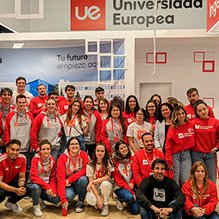
Ven a conocer el campus
Conoce las instalaciones y descubre por qué la Universidad Europea está hecha para ti.
Excelencia avalada por los mejores
Preguntas frecuentes
¿Qué es el Grado en Biomedicina?
El Grado en Biomedicina es una titulación universitaria de 4 años y 240 créditos europeos (ECTS). Forma a sus estudiantes en los mecanismos moleculares y celulares de las enfermedades. Su objetivo es aplicar el conocimiento biomédico a la investigación y la innovación en salud.
¿Qué diferencia hay entre el Grado de Biomedicina y el Grado de Medicina?
La Carrera de Biomedicina se centra en la investigación de enfermedades y el desarrollo de tratamientos en laboratorio. El Grado en Medicina forma médicos que diagnostican y tratan directamente a los pacientes. Ambos grados se complementan en la investigación y práctica clínica.
¿Qué asignaturas se estudian en la carrera de Biomedicina?
Incluye materias como genética, biología molecular, bioquímica, farmacología y técnicas de laboratorio. También se cursan asignaturas de estadística aplicada a la investigación. El plan combina teoría y prácticas en laboratorios de investigación.
¿Dónde se realizan las prácticas del Grado en Biomedicina?
Las prácticas se llevan a cabo en laboratorios y centros de investigación biomédica. En los últimos cursos puedes colaborar en proyectos científicos reales. Lo que te permite adquirir experiencia en técnicas avanzadas de biología y biotecnología.
¿Qué perfil debe tener un estudiante de Biomedicina?
Se recomienda tener interés por biología, química e investigación. También es útil contar con capacidad de análisis y curiosidad científica. Este perfil te ayudará a desenvolverte en laboratorios y proyectos de investigación.
¿En qué áreas se aplica la Biomedicina?
La biomedicina se aplica en el desarrollo de nuevos medicamentos, terapias génicas y biotecnología. También tiene relevancia en la investigación del cáncer, enfermedades raras y neurociencia. Sus avances impactan directamente en la mejora de la salud.
¿Qué diferencia hay entre Biomedicina y Biotecnología?
La Biomedicina se centra en el estudio de las enfermedades y en la investigación clínica. Mientras que, la Biotecnología aplica procesos biológicos para la industria alimentaria, farmacéutica y ambiental. Ambas áreas están relacionadas, pero tienen objetivos distintos.
